#like there is an anger to it but its underlined with a grief like i LOVED U man. and now im not there anymore.
Explore tagged Tumblr posts
Text
my tears ricochet but in the context of locklyle after lucy leaves in thb:
"even on my worst day did I deserve babe all the hell you gave me" -> lockwood being so emotionally stunted didnt know how to work thru his feelings in any way other than distancing himself for lucy through no fault of hers (or his technically)
"I swear I loved you till my dying day" -> even throughout their fight/all the way till she left (and even beyond that) lucy loved lockwood so much despite how cold he was to her and how hurt she felt GIVE MY GIRL A BREAK
"you know I didn't want to have to haunt you" -> lucy and lockwood being irrevocably tied to each other
"I didn't have it in myself to go with grace" -> all the fights with holly where lucy was acting arguably petty/immature but only because she was losing her favourite person to someone else
"and you're the hero flying around, saving face" -> lockwood always wanting to preserve his/the company's reputation, wanting to be the best/the 'hero,' acting distant from lucy cuz he wouldn't confront/accept the reality of their relationship (+ strain from him wishing she wouldnt be so reckless which like LOL pot kettle black etc)
"and if I'm dead to you why are you at the wake?" -> pre aickmere's incident, where lucy was getting more and more desperate but he was still so cold towards her
"cursing my name, wishing I stayed" -> sums up lockwood's complicated/conflicting feelings about lucy SO well, he loves her but also hates her for putting herself in danger and is so scared of being that vulnerable with her UGHH
"cause when I'd fight you used to tell me I was brave" -> this is like all those times when lucy went along w lockwood even when he was being reckless cuz HELL if she was going to let him be reckless alone, and they kind of understood each other on that level the way no one else in the series rlly does like its this sacred mutual recognition thats so special to them, but the "you USED to tell me" indicating how their relationship has disintegrated and how that special bond/ANY kind of special bond btw them is rapidly dissolving. also abt how lucy who has been so tough and strong all alone for so long in her life rlly valued lockwood's support/started to need him (was quite bad off without him in her apartment). ofc she's brave and a part of her knows it, but that warmth of having someone stand by your side to catch u if u fall?? irreplacable
"I can go anywhere I want just not home" -> self-explanatory
"you can aim for my heart go for blood but you would still miss me in your bones" -> references how mean he was towards her but underlying all that was his love and need for her still </3 also, connotation of bones = skeleton = death = the empty grave waiting for him??
"and I still talk to you when I'm screaming at the sky"/"and when you cant sleep at night you hear my stolen lullabies" -> lockwood esp is so haunted by lucy after she leaves, 'screaming' referencing lucy's predisposition to get mad rather than sad, lockwood's insomnia like it all just lines up so WELL
"and so the battleships will sink beneath the waves" -> battleships symbolising all the visitors they fought together + maybe even more personal things like helping lockwood process the death of his family, lucy's trauma etc (their shared battles), all of that being left to be eroded by time as if it never existed, as if the thousand tiny moments that made up their relationship never happened
"you turned into your worst fears" -> come off it you know I'd die for you = his number one fear is LOSING LUCY which he does when she leaves. not exactlyyy the same cyz she's still alive but without him there to '''''protect''''' her (he is so that kind of bf) its one step towards this nightmare of his materialising
"tossing out blame, drunk on this pain" -> blaming himself (which is only partially warranted), acting so out of character, becoming even more reckless as he writhes with the pain of losing lucy, becoming more detached from the value of his life etc, almost manic in the haze of his agony
In conclusion, look at how lucy's tears ricochet. thank you for coming to my ted talk
also totally not thinking abt an au where lucy dies after leaving but before she returns because she never stopped loving him even when they were fighting
#the hollow boy spoilers#this lens makes me see the song as sooo devastating rather than angry#like there is an anger to it but its underlined with a grief like i LOVED U man. and now im not there anymore.#no one look at me#i am unwell#lockwood & co#lockwood and co#anthony lockwood#lucy carlyle#locklyle#lockwood and co netflix
28 notes
·
View notes
Text
its like 2 am and im very tired so im sorry if this doesnt make sense i just want to talk about why i love scott summers.
•one of the reasons i love scott summers is because he is a flawed character who is quite doomed by the enviroment he was raised in. he makes mistakes a lot and learns that his actions have life altering consequences, later on he actually works on them.
for an example, in x-factor; scott left madelyne with their son nathan because the original 5 of the xmen were getting back together.(also the news of jean grey being alive) later on, Nathan is in the hands of mr sinister, later gets infected with that stuff etc.(idk how to explain sorry) and scott becomes aware that maybr if he didnt leave, maybe if he stayed he wouldnt lose the son he always wished to have. he is consumed by his guilt and grief. at least to my interpretion.
this is why i dont like actively calling scott a deadbeat dad because in the end he did come back for nathan.(he shouldnt have left in the first place i get that too) but calling him a deadbeat dad in my opinion just ignores his character as a whole.
or in xmen animated series, where in like the first episodes he has to leave morph. wolverine is angry at him justifibly(but its also not scotts fault(and morpherine canon guys)) scott does his best later on to be more careful to lead the team in missions, trying his best to not leave anyone behind etc its not very underlined that he does this but you can see it when you look for it.
•and not only that, i also find him very relatable and think his anger, frustration against the world very relatable. i also agree with his ideals.
cyclops ideals are a perfect balance between magneto's and professor x's ideals from my observation.
im gonna speak in xmen 97 terms because explaining my opinions is easier that way
professor x(as much as i admire what he stands for) is trying to help mutants but he is working towards tolerance, not acceptance. and like said in xmen 97, tolerance really is extinctence(i think this is how you spell it?? idk sorry english is not my mother tongue)
magneto doesnt want acceptance nor tolerance he just doesnt want humans(because of the years of opression he has faced, leading him to fight back against id but be the opressor as the time passes because humans(yes mutants are humans too) are corrupt like that)so he is trying to cause war for mutant liberation but his actions are causing people to be prejudiced about other mutants and causing them to be more violent towards them. even in the apocalyptic future, camps are being made for mutants because magneto himself started a war.(i will talk about my views on magneto on an another post because he really is a very interesting character corrupt by his own cynicism)
however what scott is working towards is acceptance and he is aware that if he just stands quiet to all the violence towards mutants and just busts his ass to save humans, he is the same as professor x, working towards tolerance. so now he uses violence to make people aware that mutants are going to live with them if they like it or not because he knows sometimes to be heard you have to scream. but his ideals towards mankind never changes because he doesnt hate them he hates their ignorance.
i do believe that since his mental health was declining(becasue of the years of opression and brutality he and his people have faced)he has done some things that were definitely problematic but this brings me to my first point of him facing the consequences of his actions.
overall, i do believe cyclops was right, i just think he also went about it wrong in some ways and that led to people not understanding him.
i find his backstory very interesting too(even though in changes but to me the orphanage later jack winters and professor x is the true one) i think about him being gaslit into forgetting his own little brother but him never faltering once and believing his own mind instead of someones tongue,his time with jack winters
(which i believe the interpretion of it being abusive because of the signs etc and how more impactful it makes that the first mutant he had ever actually known had hurt him instead of helping his own kind. it a parallel to our own world where even the opressors have managed to turn us against eachother even though we are all opressed by them, shunned because we are minorities)
later on him coming to live with professor and still being in a place where he is being used(i believe with my whole heart that professor saw scott as his son and sometimes forgot that they didnt share the same flesh but that doesnt change that professor did use scott, even without meaning any harm because professor in the end wants the best for all mutant kind but forgets to think about them as individuals)
•anyway to cut it short:
> i love scott summers because he makes mistakes AND learns from them, faces the consequences. and because of his mentality and the things he faced throughout his life that led him to making those mistakes.
there are lots of main characters in media who never really gets called out of the things they do(for example, annabeth from pjo with how she treated tyson, i love annabeth but it was just awful, also piper and her overall character(i chalk it up to rick riordan writing her badly because she is sorry to anyone who loves her))
>i love his upbringing and reading about it in any shape or form
>another reason why i love scott is because hes so bbg and miserable in a way i want to hug him so hard but also strangle him yknow
>>>>>TELL ME YOUR OPINIONS OF SCOTT SUMMERS WITHOUT BEING RUDE PLEASE!! if there is anything you dont agree with, you can always write it with the condition of being kind and not rude!!<<<<<<
#scott summers#xmen cyclops#marvel cyclops#x men cyclops#cyclops xmen#cyclops#cyclops x men#scott summers xmen#xmen scott#jack winters#marvel comics#xmen comics#alex summers#magneto#erik lehnsherr#magnus lehnsherr#cyclops was right#charles xavier#x men professor x#professor x#nathan summers#madelyne pryor#x factor#xmen animated series#xmen 97#mr sinister#xmen#marvel#x men comics#i love scott summers
55 notes
·
View notes
Note
From the ask meme: 7, 22 and 24 for Gary in UtB <3<3
7. What's one way your OC has changed since you first came up with them?
Hmm, I mean he's a peak alpha now instead of a doctor of psychology sdalfkja and he's the love interest instead of the clinical psychologist!
But specifically in Underline the Black, I'd say the biggest change from me coming up with him to now is that actually he's less of a sexual predator than I initially planned him to be, partly because he was SO uninterested in Efnisien in the beginning, and then because this story actually became quite concerned with consent, in its own way!
22. What character alignment would you consider your OC to be?
Presumably this is a TTRPG / D&D reference! In the Fae Tales verse however, he'd absolutely be Unseelie (though I'm not sure of his true appetite).
In terms of D&D I'm not sure! I think on the Good / Neutral / Evil scale, he leans more towards Neutral or Neutral-Good!
24. What is an alternative life path your OC might have gone down? How different would their life be if they'd made those decisions?
Tbh, honestly just overworking until he dies. Gary was quite apathetic when we meet him. Like, he was working, but he had no real joy or emotion in his life except for grief, and as we saw, he was super resistant to actually opening up to emotion/s that weren't just anger/resentment for a really long time.
So I think his alternative life path would really have been just 'I work too many hours with Faber and one day I die from a heart attack.'
~
From the edge OC meme!
#asks and answers#memey goodness#dr gary konowalous#underline the black#underline the rainbow#re: alternate paths like... idk aside from a world where james lives#i think all of them aren't happy#unless he meets efnisien#i do tend to write a lot of romances that would otherwise end tragically for characters#unless they stick it out with their love interest#administrator gwyn wants this in the queue
13 notes
·
View notes
Note
I’ve noticed you’re a fan of both Taylor Swift and tbosas, so what songs do you think radiate Lucy Gray Baird vibes?
IS THIS REALLY THE REPUTATION I HAVE ON HERE? LOVE IT. I have a burning passion for both of these!! This will by all means become a fangirling moment of mine, but that’s the thrill ain’t it? No but really. Here’s my list of songs that could have been written by Ms Lucy Gray Baird, originally from the musical genius and cat lady Taylor Alison Swift <3
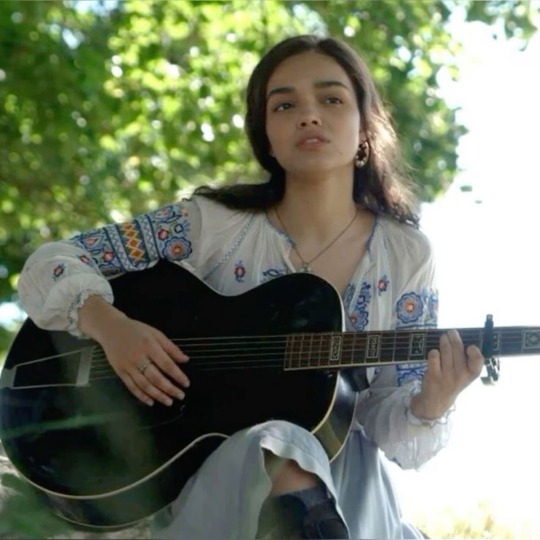
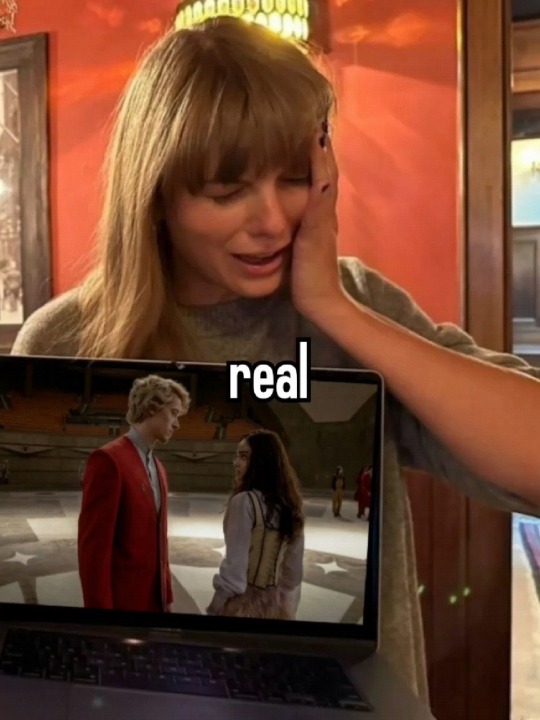
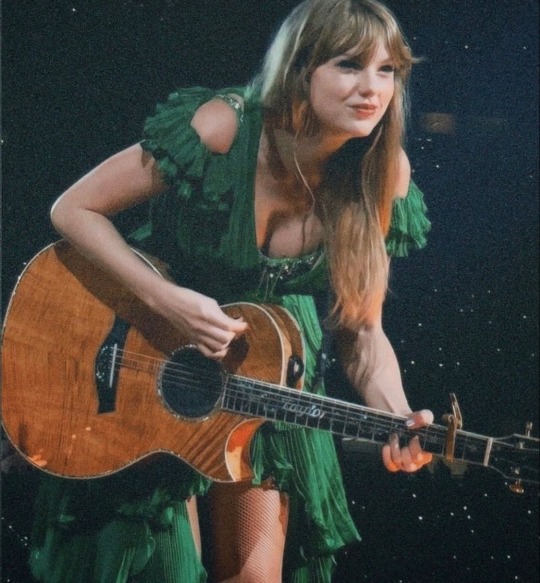
Should’ve said no is definitely a song that she would’ve written as discovering that Billy Taupe went behind her back, messed up badly and became a total asshole.
“It’s strange to think the songs we used to sing. The smiles, the flowers. Everything gone // You shouldn’t be begging for forgiveness at my feet. You should’ve said no, baby and you might still have me”
Mean walks the same path. I’d like to imagine her singing it wherever she went after Coriolanus went crazy, whether that’s up north or in the afterlife. Also something after Billy Taupe’s fuckery.
“I bet you got pushed around, somebody made you cold. But the cycle ends right now cause you can’t lead me down that road and you don’t know what you don’t know // Some day I’ll be living in a big old city, and all you’re ever gonna be is mean”
Never grow up fits as something the covey would cook together about Maude Ivory and Clerk Carmine. Potentially also about Lucy Gray. Though I feel like she could have written it about her younger cousins - especially after the games, wishing they’ll never have to go through the capitol’s sick entertainment game.
“Your little eyelids flutter cause you’re dreaming. So I tuck you in, turn on your favorite nightlight. To you everything is funny, you have nothing to regret // Don’t you ever grow up, it could stay this simple”
Haunted feels like a Lucy Gray written song right after witnessing Coriolanus shooting Mayfair. Especially something she came up with after he lied to her about “his old self”. We know the covey claims Lucy Gray to be the poet in their family, so she could easily have came up with it even in the moments of doubt and fear.
“You and I walk a fragile line, I have known it all this time, but I never thought I’d live to see it break. It’s getting dark and it’s all so quiet and I can’t trust anything now. And it’s coming over you like it’s all a big mistake // Something made your eyes go cold”
Sad beautiful tragic makes me think of Lucy Gray right before the games as she gets to the point where maybe? just maybe she’s falling for Coriolanus.
“I meet you in warm conversations. We both wake in lonely beds. In different cities and time. Is taking its sweet time erasing you, and you’ve got your demons and darlin’ they all look like me. Cause we had, a beautiful magic love there. What a sad, beautiful tragic love affair”
Before the reaping a part of her still missed Billy, so Better man could possibly fit into those mixed feelings of disappointment, longing, grief and aggression.
“Sometimes in the middle of the night I can feel you again. And I just miss you and I just wish you were a better man”
I bet you think about me as she watched Coriolanus continuing torturing and kill children because of a relationship that ended on bad feet.
“I bet you think about me, in your organic shoes and your million dollar couch. I bet you think about me when they say oh my god she’s insane, she wrote a song about me”
Bad blood. Utter disappointment and anger. When Coriolanus “chased” her down the woods.
“Cause baby now we got bad blood. You know it used to be mad love. So take a look what you’ve done. Cause baby now we got bad blood. Did you have to do this? I was thinking that you could be trusted”
Look what you made me do gives me vague vibes of hate towards Coral and her pack. Trying to poison them (succeeding with one of em!! Too bad Dill died)
“I don’t like your little games. Don’t like your tilted stage // I’ve got a list of names and yours is in red underlined // I don’t trust nobody and nobody trust me. I’ll be the actress staring in your bad dreams”
MY TEARS RICOCHET. UGH MY ALL TIME FAV SONG. ISNT IT OBVIOUS? The bridge is SO Coriolanus and Lucy Gray coded after they fell apart. Lullabies stolen by death.
“And I can go anywhere I want, anywhere I want just not home. And you can aim for my heart, go for blood. But you would still miss me in your bones. And I still talk to you, when I’m screaming at the sky. And when you can’t sleep at night - you hear my stolen lullabies”
Mad woman. No one really accepted her for who she was. Not district 12. Definitely not the capitol. In the book the hanging tree got banned to perform due to its real upbringing on unfair and cruel practices.
“No one likes a mad woman, you made her like that // I’m taking my time, taking my time cause you took everything from me. Watching you climb, watching you climb over people like me”
The lakes. OBVIOUS. AGAIN. Song she wrote during their visit at the lake, her, Coriolanus and the others of the covey. Planning on running away with him to live in the wilderness, catching their own food and never looking back.
“What should be over burrowed under my skin, in heartstopping ways of hurt. I’ve come to far to watch some namedropping sleaze tell me what are my words worth. Take me to the lakes where all the poets went to die - I don’t belong, and my beloved neither do you”
There is something about Cowboy like me that gives off Lucy Gray energy, especially right before the games. Her job is practically putting on a charm and performing (not to mention she’s REAL GOOD at it. Accustomed to tricking others by feigning love, probably like coryo and her as they tried to gain affection out of one other.
“I’ve got some tricks up my sleeve, takes on to know one // You’re a cowboy like me, perched in the dark, telling all the rich folks anything they wanna hear // Now you hang from my lips like the garden of babylon. With your boots beneath my bed, forever is the sweetest con”
Anti-hero, SHE’S DEFINITELY NOT ONE. But when first speaking to Coriolanus again she claims herself to be a murderer when in reality, she’s just a girl with willingness to survive. Lucy Gray is a confident and determined girl, but there’s a not a doubt her mind is playing tricks on her from time to time - especially after the games.
“It’s me. Hi! I’m the problem it’s me. At tea time everybody agrees. I stare directly at the sun but never in the mirror. It must be exhausting always rooting for the antihero. // Did you hear my covert narcissism. I disguise as altruism? Like I’m some kind of congressman. Tale as old as time”
Would’ve, could’ve, should’ve. None of her past lovers have stayed true, besides her life never treated her fairly either. Coriolanus and the capitol really did steal her childhood, even if it was hers first.
“And now that I’ve grown, I’m scared of ghosts. Memories feel like weapons // God rest my soul. I miss who I used to be, the tomb won’t close // Living for the thrill of hitting you where it hurts. Give me back my girlhood it was mine first”
Carolina from where the crawdads sings is such a covey tale song!!
Safe & Sound is pretty self explanatory, ain’t it?
#the hunger games#tbosas#hunger games the ballad of songbirds and snakes#lucy gray baird#hunger games#taylor swift#rachel zegler#where the crawdads sing#taylor’s version#swifties#swiftie#the eras tour
17 notes
·
View notes
Text
Movies I Liked in 2022
Every year I reflect on the pop culture I enjoyed and put it in some sort of order.
While my taste in film always tends to be a mix of crowd-pleasers and prestige fare, this year the contrast felt even starker. I call these lists things I “liked” rather than claiming they are the “best” because, though I can recognize when a film is a great work of art even if I never want to revisit it, I tend to want to share/highlight things I actually enjoy.
For example, TÁR is certainly a masterpiece that I found utterly riveting while watching, however, it’s also an uncomfortable and off-putting experience (which is of course, part of – if not entirely – the point). So the 10 films (and honorable mentions) that follow display a level of artistic acumen that resonated with me on multiple levels while also being movies I, you know, liked.
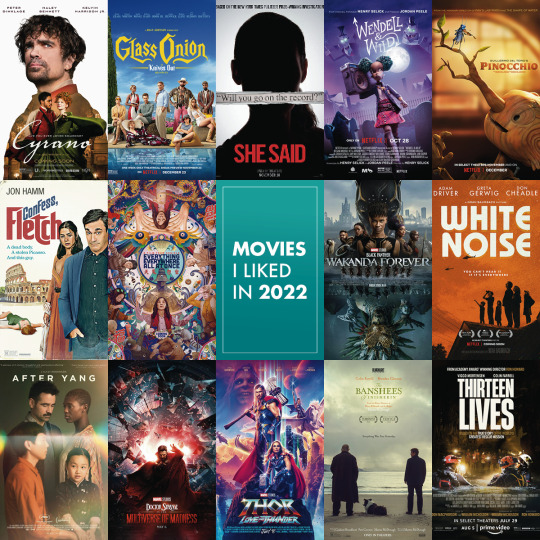
10. After Yang (Blu-ray, VOD, Showtime)
A lyrical science fiction film centered around a family’s relationship their robotic son, director Kogonada’s second effort is beautifully realized and deeply affecting. There are futuristic echoes of the likes of A.I. and Minority Report in the service of deep meditations on life, love and grief.
9. White Noise (Netflix)
Noah Baumbach’s movies are typically a few shades too caustic for my taste, I found but this adaptation of Don DeLillo’s postmodern novel an ideal artistic match. If the book is couched in fatalist black comic critique of Reaganism, then its relevance to our current Trumpist era (where the outsized cult of personality hovers over current politics even after his time in the White House) is perfectly apt. Willful ignorance, denial of death and unabashed consumerism abound, but so do critiques of ivory tower liberalism. The use of 80s filmic tropes to underline the deadpan nature of its setting and content is expertly realized, as is the perfectly (at times) indecipherable & unsettling sound design filled with lots of, what else, white noise.
8. Black Panther: Wakanda Forever (Theatres)
The best superhero film of the year is more emotionally affecting and more personal than most others in its genre, with writer-director Ryan Coogler and his cast grappling with the real-world death and absence of Chadwick Boseman. The result is kind of shaggy (especially compared to the efficiency of its predecessor), but also includes moments of dynamic action and gorgeous production and costume design, especially for newcomer Namor and his kingdom of Talokan. I also really appreciate an action movie that grapples with themes of revenge vs forgiveness/healing (and not in a way that feels wholly unearned, a la this year’s The Batman, but more like the unjustly maligned Spider-man 3); Shuri’s grief and anger are palpable as she wars with Namor – and herself – and her journey rings true.
7. Everything Everywhere All At Once (Blu-ray, VOD, Showtime)
The Daniels’ maximalist indie epic is wholly unsubtle but genuinely affecting. With themes as broad as the salvation of the multiverse being kindness and love, I suppose you need other broadness as well, including broad comedy (some of which I enjoyed, some of which I did not exactly enjoy while still admiring its audaciousness). Ultimately it is the fully realized performances, primarily those of Michelle Yeoh, Stephanie Hsu and Ke Huy Quan, that breathe life and humanity into the proceedings, making for a emotionally moving experience.
6. Confess, Fletch (VOD, Showtime)
Having never read any of the Fletch novels or seen the earlier Chevy Chase films, I really had no context for this movie, aside from being a fan of both director Greg Mottola’s Adventureland and the comedic chops of Jon Hamm. I found it to be quite a pleasant surprise, then: a fun whodunnit where the mystery is less important than hanging out with the characters, especially Hamm’s titular investigative journalist. This is the type of eminently rewatchable movie rarely made these days and I’d be quite content if the future finds us with plenty more Fletch adventures to go along with the exploits of Benoit Blanc.
4. (tie) Wendell & Wild (Netflix) / Guillermo del Toro’s Pinocchio (Netflix)
My two favorite animated films of the year both happen to be stop-motion features bankrolled by Netflix. They’re also both unique visions that don’t pander to a broad audience.
Director Henry Selick (The Nightmare Before Christmas, Coraline) created Wendell & Wild in collaboration with Jordan Peele and it’s a favorite of mine from each of their output (yeah, I liked it better than Nope). The design is a visual delight from start to finish and I found the story to be surprisingly resonant (an examination of grief and trauma as well as a critique of corporate interests and the prison industrial complex that also has a lot of great humor and a killer soundtrack).
Del Toro’s version of Pinocchio also features critiques of power, as he sets the tale in fascist Italy. Subverting the quite on-the-nose {ahem} morality of the original story, in del Toro’s vision, it is being yourself and not conforming to puppet-like assimilation that makes one worthy of the gift of life. The design here is stunning as well, especially in the creatures featured throughout.
3. She Said (Blu-ray, VOD, Peacock)
Add She Said alongside the likes of All The President’s Men and Spotlight as a worthy entry into the cannon of great films about investigative journalism. The true story of the New York Times’ investigation by Jodi Kantor and Megan Twohey into Harvey Weinstein’s crimes, it is a truly moving testament to the heroism and perseverance of these journalists and the incredible bravery of the women who chose to confront an ingrained patriarchal system of abuse. The lead performances by Carey Mulligan and Zoe Kazan are expertly pitched and fully lived in, while simultaneously allowing the stories of the women they interview to truly shine.
2. Glass Onion (Netflix)
Knives Out was my favorite film of 2019, so it was probably inevitable that its follow-up would make an appearance on my list. Thankfully, Glass Onion does not disappoint – it’s a “lighter” and perhaps broader mystery romp, but it is just as smartly constructed and excellently performed (by an entirely new cast of characters, aside from Daniel Craig’s returning Benoit Blanc). While lacking some of the depth of the social commentary of its predecessor, the caper still has a lot on its mind, and its reveals and takedown of the ultimate culprit is immensely satisfying.
1. Cyrano (Blu-ray, VOD, Amazon Prime)
Though technically a 2021 release for awards purposes, Joe Wright’s adaptation of Erica Schmidt’s stage musical Cyrano didn’t really release until February 2022 and it has stuck with me ever since (so much so that I saw it multiple times during its brief theatrical run). As a fan of the National, I was intrigued by the prospect of the music from that band’s Dessner brothers with lyrics by frontman Matt Berninger and his wife Carin, but was surprised at how much the songs moved me, especially as sumptuously staged by Wright. Hayley Bennett and Kelvin Harrison Jr shine as the pair of young lovers Cyrano reluctantly brings together through his words, but it is Peter Dinklage in the title role who is the heart of the film, exposing the soul of the lovelorn poet whose wit and bravado masks his self-doubt and pride.
Bonus! Honorable Mentions:
Doctor Strange in the Multiverse of Madness and Thor: Love and Thunder (Blu-ray, VOD, Disney+)
The original Doctor Strange and Thor: Ragnorak both rank in my top 5 Marvel films, so I was understandably excited for their follow-ups. And I left mostly satisfied, even if neither reaches the heights of its predecessor. Multiverse of Madness is allowed to be the MCU version of a horror film with plenty of ghoulish Sam Raimi flourishes, and I really loved the audacity of introducing a group of alternate reality heroes known as the Illuminati – including the first official MCU appearances of members of the X-Men and Fantastic Four – just to (spoiler alert!) quickly dispatch them. Love and Thunder tries to do a lot – maybe too much – but still contains great heart and humor typical of Taiki Watiti, plus a great go-for-broke villainous performance from Christian Bale as big bad Gorr the God Butcher. There is a stunning visual innovation on tap as well, displaying some of the most artistic uses of digital effects in recent memory (see the black & white battle sequence).
The Banshees of Inisherin (Blu-ray, VOD, HBOMax)
I quite enjoy Martin McDonagh’s latest (well, as much as one can enjoy such a film), but it doesn’t quite reach the heights of In Bruges for me. I would recommend it, however. As quietly beautiful as it is quietly devastating – yet with an abundance of humor, often served pitch-black.
Thirteen Lives (Amazon Prime)
Ron Howard’s presentation of the 2018 Thai cave rescue is immediate and compelling, relating just how many diverse parties came together for the massive and dangerous operation of saving the trapped soccer team and coach. While it doesn’t eclipse the excellent documentary The Rescue, there are benefits to dramatizing the story, such as glimpses into the Thai boys’ homelives and the sacrifices made by area farmers that enabled the mission to succeed.
Avatar: The Way of Water (Theatres)
More of a thrill ride or immersive experience than a normal movie, the second Avatar outdoes its predecessor in just about every way. The plot is (somewhat) more novel, the characters are more engaging and the effects more visceral and spellbinding. That said, for me, it’s an in-the-moment experience that I haven’t thought much about since leaving the theatre and I doubt would be anywhere near as exhilarating at home. I’m happy it exists but definitely don’t want all movies to be like this. (Plus I really hate high frame rate, especially the choice to arbitrarily cut back and forth between 24 and 48 fps in its director-approved presentation.)
1 note
·
View note
Text
damn it, he's at the front door, so why's he hesitating? all he's wanted since his revival was to see dar'khol, to touch him and prove to himself that the stars hadn't made a cruel exception, but what's he going to face? disappointment? grief? anger?
what he doesn't expect is to be greeted with a yell-- a ringing, overjoyed yell. he doesn't expect to be ran at with open arms, either, or for a smile to find its way onto his own weary features as they collide.
"w-whoa, hey--!"
he feels the familiar warmth wash over him, soaks in it. it's as much a balm to his aching muscles as it is a strain; the sharp, crushing pain nothing against the flood of relief now that they're together again, alive.
it's a balm so effective he's nearly tricked into believing everything's fine now. but it isn't, and every moment he stands here in dar'khol's arms, pretending like it is, feels like a betrayal in its own right.
"where have i been?" softly, he echoes, almost disbelieving as he pulls back. his grey, red-rimmed, tired eyes wander across the other man's wounds-- fresh wounds, sloppily dressed. that, yuri's used to, but the scar over his heart... that's new. where his own heart drops at the sight, volume rises, "i left a warning, dar, and you're out there busting your ass again? dam-bi wasn't enough for you!?"
a choke, then-- that shuts him right up. they're sputtering, short breaths in bodily memory of torn lungs, not quite ready to be used on an outburst. his embrace tightens, fearing he'd crumble without it.

though the flare passes quickly, his head remains lowered. "sorry," he gulps, releasing it with a shaky laugh, "i mean, that's just like you, isn't it? should've known."
even yuri has a limit to how much he can carry, and he'd reached it-- the good and the bad, underlined with guilt. here his partner is, worrying about him after facing his own worst fear, and yet he's stumbling. he wants to tell dar he's happy to see him, that he's been worried sick (that he loves him and he's an idiot for needing death to be what made it click)... but he can't. he doesn't know where to start, or if he should.
"heard the story from the source herself," he continues into dar's shoulder, trembling fingers brushing over a soaked bandage. "what were you thinking, taking her on alone like that? what the hell happened to doing things together?"
( @darkenforcer )
the silence of the house is broken with a muffled grunt, followed by a tear. hands working carefully against bare skin, covering each gash and bloodied cut he could catch within his reflection. would have been a far easier task had he the means of healing it himself ( or if bibidi had been left with his magic ), leaving everything to scar up like the rest in typical, messy fashion.
didn't hold much luck in that department, or any department for that matter.
having come back home beaten, bruised and empty handed wasn't much of anything to celebrate. everything still ached as it should, phantom pains leaving behind a limp, and a steady discomfort with each intake of air.
yet, still, here he stood licking the wounds of his most recent outing. unable to leave things well enough alone when so much damage had already been done. if not for bibidi tagging along, dar'khol may as well have been buried a second time. that bird put up with far too much... and he couldn't be more thankful of that.
heaving a sigh, dar gave himself another look over in the bathroom mirror. checking over his work and placement of each bandage, gauze and wrap applied. carefully avoiding glancing over the left side of his chest all the while.

"he ain't gonna be too thrilled with me, is he...?"
a quiet musing that went unanswered, if only briefly. there's a smaller sound that causes a twitch in his ear, attention drawn to the small cat sat upon a shelf behind him. her yawn was his only answer.
he hated it, honestly. the quiet of it all, that is. aside from his feathered, and furred, companions... he'd been the only one to come home. no other voice to combat his own, not even a gentle buzz of his phone with an update. he hasn't heard a single thing and he's been doing all that he can to keep his thoughts in a positive light ( weighed down as they were by his own mistakes ).
the miqo'te breathes another sigh, fingers outstretched to fetch another bandage, noticing a spot he'd missed. he'd only managed a single pull of the wrap before his ears were shooting up, a pain swelling in his chest at the way his heart beat heavily.
the sound of the door being pushed open, the weight of those steps and the soft follow up of claws against a hardwood floor -- he'd recognize them anywhere.
with a clattering of medical supplies, thudding steps and boo's shrill, startled meow, dar'khol had sped out of the bathroom. practically tripping over himself as he rounded the corner and ran to the door.
"yuri!!"
it's the only warning he gave before barreling forward, all manner of approach lost in the clouded excitement ( and relief ) that consumed him so entirely.
arms had extended within a breaths time, flung around the other man's torso before he could even move through the foyer, just barely stopping himself from knocking the both of them over. every part of him hurt, throbbing from the pain of being forced through such a display of erratic movements. but he didn't care. not of the aching in his leg or arms, not the near crippling fire thrumming in his chest -- all he cared about, in this moment, was that yuri came home.
still in one piece, alive, real... he didn't know. didn't want to assume, refused to!
"where the hells have you been?!" words are hissed, but they hold no true anger. how could they? after everything dar'khol had put himself through, after all that was going on... gods, how could he be angry in the slightest?
#ic#innerbeast#innerbeast 11#death mention tw#injuries tw#not Quite the same length but close enough. daryuri novel threads r BACK ON!!!!!#starting off strong w/ a hypocrite moment and everything. a staple
11 notes
·
View notes
Text
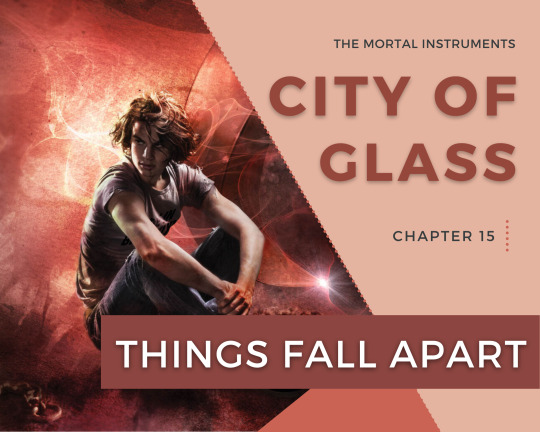
This is just full of Jace’s character narration done by Luke and Isabelle, both simultaneously trying to score some sympathy points for Jace. This is just me complaining my way through, but honestly.
Fuck this chapter in particular.

We begin this chapter with these good ol’ classics. No commas.

Senhora Monteverde runs the Lisbon Institute with her husband Senhor Monteverde. Basically Mr. and Mrs. Monteverde. They weren’t even given first names.
There’s been extensive conversation over Robert’s character on the blog, but I want to note this anyway. Luke’s dislike of Robert is unnecessarily underlined here. In this scene Robert is devastated by the death of his son, yet Luke has to remark how he never really liked Robert before he can show any sympathy for Robert’s grief.
The only purpose that I can see in this is that there's no misunderstanding that Luke likes Robert in any way because Robert is somewhat controversial character especially at this point, and we can’t have such a good person like Luke have that judgement fall on him for sympathizing a former extremist (whose young son was just brutally murdered).
Luke emits just enough sympathy here to make the difference.

I’m really hard on using any filter words, but I wanted to note an example where it works the way intended. Luke can’t see them, but feels/senses their eyes on him anyway.
But why even Amatis? WE WOULDN’T KNOW! She’s shown nothing but care and concern for her brother and regret and anger towards herself for how he treated Luke in the past. Why wouldn’t she look at him??

Same subject, no comma. But then again, without comma, does it seem like they are about to endure all the death in the same place again? THEN AGAIN, they are in Idris so it is the same place.
I’d still go without comma because that last clause doesn’t have a subject.
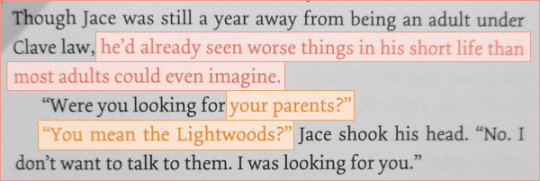
No, Luke means your comatose “mother” in New York and villainous father in currently unknown location.
In this book, Jace is in serious need of guidance and Luke does fill that bit on couple occasions in the story. But being Jace’s guidance counselor comes with a side effect of narrating also his past traumas and pain to the readers.

“Or scare them” is not an independent clause, hence no comma. “The Clave” is the common object and “the sight of all those Downworlders” the common subject in these clauses.

Continuing on the aforementioned point of Luke narrating Jace’s traumas. But it’s interesting to think about, because the only potential safe adults are strangely absent from the story. Also saying “by the adults” sounds though like all the adults currently in his life and ones in the past.
There is no word on Jace and Robert’s relationship but he and Maryse haven’t used Jace for anything. Maryse’s counter-intuitive ways of protecting Jace and her fear of Jace being sort of a Trojan horse in City of Ashes could count as betrayal, but Maryse proved her love and care for Jace and he chose to remain with his family.
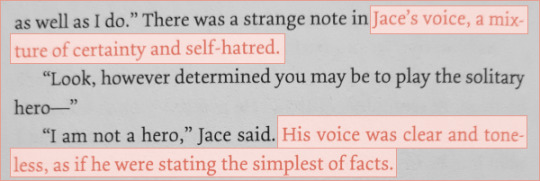
Also self-hatred noted, just so you know Jace is truly tormented. This scene where Jace tells Luke about his plan and they converse about it, it’s hard to describe. It feels like tiptoeing around the edges of complete self-indulgence, where Luke is the vessel for sympathizing Jace and noting these things about him, explaining Jace because the writing apparently can’t on its own.
Look at all this pain Jace is carrying, how much he has suffered, but no, he doesn’t think he’s a hero. Look how he says it, but he doesn’t realize he iiiis! Can’t you see? Despite everything he’s been through (MORE THAN ANYONE IN THE WHOLE WORLD), always being so self-sacrificing and everything!
...Like that. It’s like fishing some sympathy points for Jace.
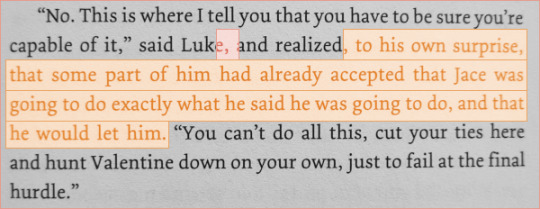
Everything is always so goddamn surprising for these people. “To his own surprise” and “some” are like cushioning the fact that Luke is going to let this teen boy go on what would essentially be a suicide mission if it weren’t for Isabelle. And he still ends up dying anyway.
Also no comma, same subject.

Father’s pride, the only true goal in life. I have a list of things that are better than this:
The parents he already has and who love him and sure as heck are proud of him anyway
HIS “MOTHER”? MAYBE? MORE LIKELY?
The first comma is grrreat, it separates two independent clauses. The second comma it the same old bullshit I’ve been on about throughout this whole book.

→ “She gasped and jumped back, thinking it was alive.”
It’s not that hard to show.

This is probably the second supposition Clary makes about Amatis’, the first one is Amatis making cookies being so weird. Oh my god, who knew Amatis knows how to make cookies and wants to make them? Not me for sure, I don’t know this woman well at all. And neither do you Clary.
Then we get to the good part of the chapter. So good in fact that I am totally tired of this Let’s Narrate Jace thing altogether. It’s like my brain’s melting, help.

Clary accuses Isabelle of not caring enough about Jace, which is funny because it has been the biggest part of Isabelle’s character so far. The only true consistency in Isabelle’s character has been her unwavering loyalty and deep care for Jace.
The only useful things Clary has done so far is get the Book of the White back from the Wayland Manor with Jace and rescued Simon with Jace and Alec. Otherwise her behavior has been downright repulsive. This isn’t some moment of growth for Clary, to not say such horrible things and making bullshit assumptions because others aren’t reacting as strongly as you are, i.e. not obviously caring enough. This is just Clary running her mouth before Isabelle sets her even somewhat straight, but even then there’s nothing even close to developing as a person going on in Clary’s brain.

Clary doesn’t get shit. She was never raised the way the Nephilim are. Always at war, always at heightened risk of losing someone you love. How could she get it? It’s not her fault, but she still doesn’t get anything. And Isabelle thankfully says so.
ISABELLE NOT LIKING CLARY BECAUSE [INSERT REASONS] IS NOT AN ARGUMENT ANYMORE.
Isabelle has made clear she doesn’t dislike or hate Clary. But Clary is constantly throwing Isabelle not really liking her at Isabelle’s face. It doesn’t matter what Isabelle says, Clary is still written making this non-argument. Additionally, Clary always fails to reflect how her own behavior might affect how people perceive her. She doesn’t get at all that her own behavior might just be the key to understanding why sometimes people have hard time with her around. And fuck off with your surprise.
Then Isabelle makes an incredibly valid point. Clary doesn’t know Jace like she does, she can’t know him the way Isabelle does because Isabelle has known him longer. BUT WAIT. It is spun around in a way that it only gives credibility to Jace’s super deep and amazing (UTTERLY NONSENSICAL) love for Clary.

Jace loved Clary, but for fucking why? What is it about this obnoxious, self-centered girl that made her just so amazing that all it took was one glance at her and Jace was obsessed. Clary and Jace’s relationship remains hollow because the basis for it is made of 100% bullcrap.
This is Isabelle’s purpose, to narrate Jace and later save him from getting his ass handed down to him. But mostly to narrate Jace’s character.

Isabelle speaks the truth. How can Clare write a character that is just so right about Clary? Because Isabelle isn’t saying it for Clary to reflect on! To take her words to heart and learn! For fuck’s sake, here Clary even thinks they are both just crying about Jace, just two gals that love that dude a lot.
NO.
Clary prances around in borrowed stolen gear, wants to ram her untrained ass into places it doesn’t belong, but also doesn’t step up and take part. She portals herself into Idris because she wanted to go, no matter the consequences. She marches over to the Penhallows’ and demands to see Jace. Like fuck all else because Clary has a mission that is more important than whatever problems anyone else is having.
And then enter Simon:
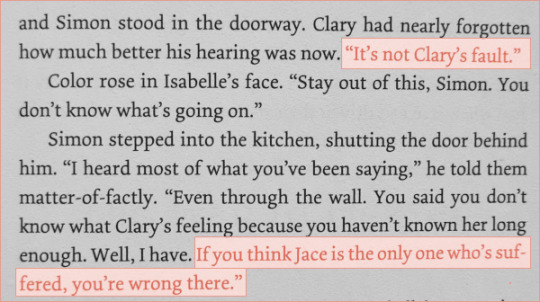
What Jace decides to do is on Jace. But pretending like anyone can wash off their hands from this mess is dumb as hell. The point of the conversation was Clary being indifferent to how her behavior affects others around her. Not whether Jace is the only one suffering. No one said that, but now this has turned into a fucking declaration on how both Jace and Clary suffer so much over their dumbass love story.
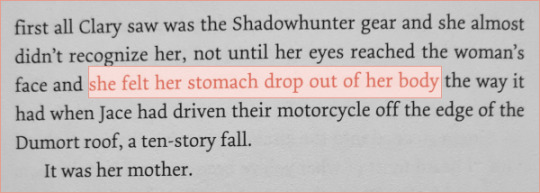
→ “Her stomach dropped out of her body.”
Saved by the bell. Clary doesn’t have to think about anything she and Isabelle discussed because now she gets to yell at her mother and be obnoxious again.
#I said I try not to curse#But I guess that's out the window for now#I'll just drop this here and get to my inbox#Clary Fray#Jace Herondale#Luke Garroway#Isabelle Lightwood#Maryse Lightwood#Amatis Herondale#City of Glass#CoG Chapter 15
9 notes
·
View notes
Text
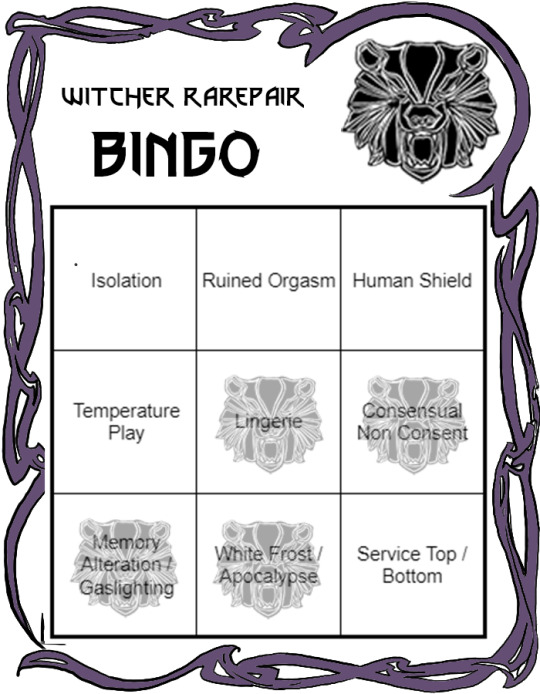
Drown With Me If You Can
Prompt: White Frost/Apocalypse
Relationships: Arnaghad/Erland of Larvik (from one of the witcher-centric cards)
Rating: M
Content Warnings: swear words, grief, themes of giving up on life and hopelessness at the beginning
Summary: After the fall of Kaer Seren, all that is left for Erland to do in his gloomy cave is write his journal and let the cold take him. He doesn’t expect to be saved, especially not by his former-lover-turned-nemesis Arnaghad. In which: Erland wallows and Arnaghad calls him out on his bullshit. A lot.
Word Count: 5.6k
AO3 link
I.
I close out this account with a warning: the knowledge I hereby hope to preserve is essential for the day the monsters return to our crypts, our battlefields, and our gardens. It is a call to battle and heroism and in that it is treacherous. If you use these pages with the intention to do good in this world, you will soon find yourself to be an outcast among humans. You will save them and they will spit at you. You will beg for fair payment and they will burn you at the stake. Be prepared for that, and take up the sword nonetheless for if you do not, no one will. Peace, brothers and sisters of the future, peace and blessings of the Gods. May you never need this journal.
Erland signs the bottom of the last page with fingers gnarled by the cold, trembling from how his muscles have hardened as a result of his lethargy. When it is done, he grips the quill hard, clings to it. It is a childish instinct that makes him do this, but this feather has been his lifeline for the past… past. A lifeline to the past. Time flakes away from Erland the same way the tattered pieces of the quill do once it breaks under his tightening fingers. The last few pages of his journal are barely legible and he can’t tell whether that is because his vision is fails him, like a pane of glass slowly devoured by a sheen of ice, or because his script has fallen prey to his tremor. As Erland waits for the ink to dry, he uses his weak hand to arrange his good one into the proper gesture for an Igni and casts it down the dark tunnel of his home.
A perfect cone of lightly crackling flames shoots outward, illuminating the glazed rock all around. The sign holds for several breaths, steady and sturdy and its heat singes Erland’s frayed cuffs, has the ceiling drip crystalline melt-off. Erland smiles grimly to himself and shuts the journal. This time can’t take from him and the ice won’t feast on, this his body will always know how to do. A perfect channelling of what Chaos he may access.
Shaking, Erland crawls over to his makeshift bedroll – a dirt-hardened pellet of furs he collected on his way up here, a long hike with Kaer Seren a steady ruin at his back and the names of his brothers and children a steady weight on his shoulders – and collapses on top of it.
It is done. His lips trace the outlines of these words, but his tongue is too heavy to lift. Erland sneezes into his pillow and draws a ratty quilt over himself. It used to be bursting with reds and oranges, a gift from an old woman for saving her granddaughter from an early death by harpy, but now it is faded and as grimy as the rest of him. Erland cannot distinguish the colours of his belongings any longer, not even in the stale light of the last sparks of the Igni that cling to the cave’s walls.
It is done.
His journal is finished, his life chronicled, his school honoured and his knowledge preserved. All that is left to the former griffin master is to wait for the sparks of his life to die out alongside those of his magic. Erland flops onto his belly and uses his weak hand to arrange the fingers of his good one into the shape of Axii. His wrist creaks when he angles the hand at his own face and he casts it with the same impeccable precision. The spell hits instantly and his body goes slack, his mind punctured through by holes. Erland sleeps and hopes a harsh wind will blow through his abode tonight.
II.
There is a long interval of darkness that is marked by bursts of hot and cold shivers that wreck his body, but Erland doesn’t truly wake and by the time he does, he isn’t sure that they were real at all. He goes through a stage of sleep paralysis in which all he can do is to stare at the coarse ceiling of the cave. It has frozen back over and if there were any light, Erland would see his own face reflected in it. Sunken cheeks, eyes reddened from burst capillaries, undercut grown out into shaggy strings of hair. The griffin tattooed on the side of his skull drowns in them, just like the griffin witchers drowned in dust and snow the day their school was buried in an avalanche.
Erland sighs. He cannot move a muscle for half an eternity. His nose itches and another sneeze finally frees him, releases him into an unsettled slumber that pushes him along the maze of corridors that is his own memory. He retraces every step he took along the Path, faces all the monsters he slaughtered and all the humans he failed to convince that he shouldn’t be slaughtered alongside them.
There is no lesson to be learned from these dreams. Only patience. Erland has long lived with his regrets, knows them as intimately as the beasts whose traits he noted down in his journal. Only patience, yes. In all his striving to be more than a mere mercenary or rat-catcher perhaps his most undervalued and least practiced virtue.
Erland can be patient.
He vaguely remembers one who never was, an old friend, a former lover who faced the world with steel first and foremost, steel accompanied by a detached pragmatism that was so at war with everything Erland believed in. That friend – now less than an enemy – would not have lain here so wallowing in the drawn-out pain of his end days. He would not have waited for his death, he would have summoned it by drawing his slowly rusting blades and cutting himself open, would have watched his hot blood hiss against the ice at the heart of this mountain and would have born a proud curl of his lip until the moment the fire in his own heart extinguished.
Erland smiles and his jaw creaks.
He takes the high-road.
He…
He sleeps.
He thrashes.
He recites every lesson the knight Gryphon ever taught him. They are the foundation of his life’s work, they are all he has left.
He is patient.
III.
Erland is caught in a sleep paralysis once more when it enters the mountains. The monsters usually haunt him when he’s somewhere in the realm of insanity, but now he is wide awake, body one rigid line under the quilt that has long since lost its ability to keep out the winter, which means the thing could be very real and out for his blood. Its steps boom and quake through the rock for hours before the giant passes into the dead end that is Erland’s makeshift dwelling. Even with no light to illuminate it, Erland can see it glittering, can see its giant head swing left and right, can hear the scrape of its fragile marble skin against the walls.
An ice elemental.
If Erland is extra lucky, this used to be its lair and he accidentally usurped it. There is no moving away, no putting up a fight and he resigns himself to a quick and violent death after all. How graceful of Destiny to show her face now, after everything else has passed her by.
But then the ice elemental shakes off the snow, hundreds of flakes that rain down to cover the floor, and Erland blinks. The outline of the monster softens from harsh crystals to wet strands of fur that hug broad shoulders. A werewolf? Erland can’t draw breath, doesn’t trust his ears when the thing opens its mouth and speaks, a deep baritone. Not nearly raspy enough to be of anything other than human origin.
"Alzur’s rotten balls, Erland is that you?"
Erland wants to laugh. Of all the demons the depths of his consciousness could have summoned to this cursed place, it had to be Arnaghad. Arnaghad with his hulking form and his smooth voice, his tattered bearskin overcoat and his terrible timing. Always terrible. He can’t laugh, of course, can’t do more than wheeze faintly.
A torch flares up, casting eerily long shadows at the feet of the apparition, more real than anything Erland has thought in a long time. At the same time, Erland catches Arnaghad’s eyes – dark ochre with narrow slits, eyes that are set deeply under bushy eyebrows which underline the blocky shape of Arnaghad’s face as though it was whittled from planks of red birch – and Arnaghad starts.
“It is you,” he says and follows that up with a curse Erland can’t discern, courtesy of Arnaghad’s Gemmeran linguistic oddities that persist to this day. With them comes a harsh edge to all his syllables and a tendency to mouth-breathe. Funny how after decades of reciprocal avoidance, Erland still remembers these details. Casting his mind down the drainage canal of history, he also remembers himself: a young fighter, just two decades of age, stuck in a body that was overflowing with emotions of visionary self-determination, of rough-and-fast passion, of compassionate anger. Erland waits for the spark of that anger to rekindle, especially as he watches Arnaghad toss his swords and pack and drop to his knees by Erland’s pellet, the torch held close. It’s heat licks across Erland’s cheeks and cradles his skull.
It remains the only heat.
His anger is but a relic of a more complicated time.
“By all the gods,” Arnaghad breathes, hand passing over Erland’s sweaty forehead. His touch too feels familiar, feels too familiar, but his scent isn’t and neither is the concern that drenches his tone. “You look like a giant lump of bird shit.”
Erland’s nostrils flare. Slowly, ever so slowly, his lips peel back in a snarl. He still can’t move, no matter how much he tries. He wants the ice elemental back, if only for the simplicity of its puny gravel brain. Arnaghad’s may only be a smidge bigger and more substantial, but with that comes so much. Arguments that have been left unburied, thoughts that have been left unspoken, memories that have been left unfinished.
Erland hisses weakly through his teeth and Arnaghad growls in reply. He doesn’t extinguish the torch, he sticks it into the ground somewhere to Erland’s right and sits back on his heels, the growl building and building. Erland drifts off again, waiting for Arnaghad to speak. He hopes that when he wakes, the phantom will be gone.
IV.
If anything, Arnaghad has solidified by the time Erland opens his eyes again. He sits by Erland’s bedside still, even cross-legged tall enough that his head grazes the ceiling of the cave if he straightens. Before him he stokes a small campfire with several crude bursts of Igni.
“That is a waste of precious firewood,” Erland says, voice croaky. He pushes himself up onto his forearms, head sluggish to lift from the scratchy pillows. Arnaghad doesn’t turn around, instead he retrieves an iron pot from his belongings and presses it against the cave’s wall, using his dagger to scrape off the ice there. Practical, first and foremost, that is exactly how Erland remembers his lover of yore. Lover being a euphemism for something Erland still cannot name.
“I’m hungry,” Arnaghad says and fires another sign. Briefly, the cave explodes with heat and Erland just about stifles a vulgar moan. When did he last have the pleasure of warmth this intense and indulgent? The fire slowly seeps into his blankets and furs and nestles against his skin. He sinks back into them and closes his eyes. “Besides,” the bear witcher continues. “You might have died of hypothermia if I hadn’t started it. It’s almost funny, Erland the righteous asshole letting himself freeze to death, where is the glory in that? Alas, I find it hard to believe that you have developed a sense of humour since last we met.”
“Neither have you.”
“Ha,” Arnaghad says and that’s it for a while. Erland listens to the water boil, to Arnaghad hacking at dried vegetables and jerky. It doesn’t even smell bad and despite his self-imposed fast, Erland’s stomach rumbles and the inside of his mouth feels coated in dirt. How long has it been since last he drank? It didn’t matter until Arnaghad stampeded into his life again, shaking him awake.
Erland sneezes.
Maybe not all of him.
“Bless you,” Arnaghad grumbles. “So, how did you end up here, little birdie? Your wings broken?”
“I’m not little and griffins aren’t birds.”
“Smartass.”
Erland snorts. He isn’t about to stoop down to Arnaghad’s level and start bickering and he has no inclination for small-talk. That’s what he tells himself anyway. A part of him is almost… glad for the company. Glad for this company in particular. Fuck that.
“I will allow you to stay the night,” Erland says, and squints to see Arnaghad raise one of his caterpillar eyebrows at him. It isn’t like either of them can tell day from night, and depending on where Arnaghad entered the tunnel system of the Dragon Mountains, the last time he saw sunlight may have been weeks ago. “Fine, I will allow you to have a rest. After, I want you gone.”
“I don’t care what you want. If it hadn’t been for me you would be a corpse right now. Take a peek.”
Erland follows the gesture of Arnaghad’s hand and glances down himself, gingerly lifts the blanket. He is swathed in thick, padded linens, an extra pair of breeches and woollen-knit socks. The bearskin that usually hugs Arnaghad’s shoulders is draped across him and what is more, his lips do not feel chapped any longer. His hair curls around his head in a long, neat braid, like a viper in slumber. Shit, how long was he out for?
“Have you considered that it might have been my explicit wish to die?”
“I have,” Arnaghad says on a low chuckle. “A ridiculous notion. You’re sick, that is all. Sick people lean towards melodrama.”
“I’m not being melodramatic,” Erland replies and, oh, there it is. Frustration breaking through the hard-packed stratum of the years like a flower through the earth in early spring. It’s fast to burst and blossom. He does try and sit up after all, but before the world can start to spin around him, Arnaghad has roughly pushed him back into the sheets.
“You are always melodramatic,” the bear witcher replies and glowers at him, face cast in darkness by his bulky outline. Erland’s eyes narrow.
“One night,” he says. “And then you’re gone.”
“We’ll see about that. The stew is going to have to cook for a bit, and you should go back to sleep. Want me to Axii you?”
“And have you make minced meat out of my brain? No thank you, I can do that myself,” Erland snaps. He’s being petulant, why is he being so petulant? It’s all these rifts tearing open in his chest, all these holes he abandoned when he left the order with his friends to found the griffin school. These holes pull him back to life and reality, pull him back through time and into a persona he thought he buried. Erland is not a child. Erland is the griffin grandmaster, Erland is a knight, Erland is a witcher. It doesn’t matter that these functions are all theory now, they make up his identity. Not Arnaghad and his quarrels. And yet…
Erland turns away, facing the wall. When he makes the gesture for the Axii, he doesn’t even have to use his hand to arrange the fingers. He didn’t want to live. Now he does. And that’s more than he can take after everything he’s lost. More than he deserves, really. Erland puts very little force behind the sign, letting it spill to the tips of his fingers then gently touching them to his own face and thankfully, the world blots out around him.
V.
Arnaghad’s voice pulls him up again, like the detonation of a bomb.
“Wake up, stew’s ready.”
Before Erland is fully awake, a coughing fit grips his body and although it scratches at the back of his throat, it also feels freeing in a way, loosening the plaque on his bones and the dust in his chest.
“So you’re still a victim of your winter sickness,” Arnaghad laughs. “I wondered.”
“What do you know of it?” Erland’s voice is muffled as he wipes his mouth, the words come out spiteful, acidic. This time, he does have the strength to sit up on his bed, but he needs the sturdy stone wall at his back to keep him upright. It’s a cool antithesis to the slight swelter of the cave’s air, a gracious counter-force to the merrily burning fire and the bubbling stew.
“Erland, you have spent twenty odd winters in my embrace, would you not think some of that has stuck with me?”
“In the face of your betrayal, no, I would not,” Erland says, crossing his arms, though admittedly, Arnaghad is right. Erland has always been susceptible to the cold, more so than any of his fellow witchers. Perhaps that is because Skellige, in the shape of his mother, rejected him when he was young, or perhaps it is because of his father whose origin Erland still doesn’t care to investigate. Either way, when the frost’s first tendrils start to wind their way into the atmosphere, he falls ill with sneezes and shakes, fevers too. It must be winter already then.
“My betrayal, yes,” Arnaghad mutters and retrieves a wooden bowl from his pack into which he shovels some of the stew. It smells prickly and hot, thick with Ofieri spices and has Erland’s mouth water. Now that he is fully himself again, his senses have returned, an assault on his mind. As with any battle he ever fought, Erland decides to be methodical about it. First the food, then the fight. He reaches out for the bowl, but Arnaghad scoffs at his trembling hands. “Don’t think I’ll let your atrophied muscles spill any of this. It’s too damn good, here.” Arnaghad settles into a cross-legged seat before Erland and the fire paints a halo around him. He’s so big that it cowers at his back, which suits Erland fine. This way it is easier to ignore the concentrated, caring expression on the bear witcher’s face as he submerges a wooden spoon, scoops up a chunk of whatever dried meat he put into the stew and gently blows on it before holding it out.
“Why do you care?” Erland asks weakly, lips parting around the spoon. As soon as it hits his tongue – the perfect degree of scolding hot and spicy – he can’t help a small groan. Blunt though Arnaghad may be, his cooking has always been phenomenal. Erland’s stomach mewls for more.
“I always cared.”
“Funny way of showing that.” Erland gives him a pointed look and Arnaghad’s eyes dart along the scar that neatly sections Erland’s face. He has yet to receive even an attempt at apology for it. “Back then you didn’t seem too caring with me. In fact, I acutely remember your sword flaying me.”
“If I’d wanted to kill you, you would have died. But I didn’t want that then and I don’t want it now. I hold to my promises, Erland.”
Accusation is slabbed thickly onto those words and Arnaghad holds out another spoonful of stew which Erland dutifully swallows. It’s not the first time the sickness held him down so hard he had to be fed, but it feels strangely agitating for Arnaghad to be the one to do it. After he left and founded his own school, the only snippets Erland ever heard about the bear witcher were rumours of his death, especially with the vipers splitting off the bear school. Perhaps, Erland liked to believe that Arnaghad was dead because that took away the possibility of whatever was happening now. Perhaps, Erland left the one promise he spent all his life circumventing at Morgraig Castle the day he set out for Kaer Seren. Perhaps, Arnaghad didn’t change at all and neither did Erland.
“Do you even remember?” Arnaghad asks quietly, then allows himself a few gulps of soup before refilling the bowl. He doesn’t meet Erland’s eyes, but Erland can see the faint glow of anguish speckling his cheekbones. Oh, but this is bad. If Arnaghad goes berserk in here, they’ll both be buried in rock and ice and Erland is too awake and vivacious now to want that.
“Remember what?” Erland asks, feigning ignorance as long as that leaves him the proverbial high ground, the only place from which he can match Arnaghad’s sheer height. He accepts another two spoons, then shakes his head. His stomach feels brilliantly full, close to bursting, and he rubs it weakly. Arnaghad puts the bowl to his lips and drinks the rest of the stew. They’ll both want more later, especially with the firewood dwindling, but for now the next field is to be played. It all gets muddled anyway, who is he kidding. Erland sighs and that lets Arnaghad’s gaze snap upwards, latching onto Erland’s. They silently glower at each other for a handful of breaths.
“Of course, you do,” Arnaghad says eventually. “Knowing you, you remember your exact words.”
“I do,” Erland says and the ghost of his own voice flashes through his mind.
My heart lies at the end of a dream, Arnaghad. And as long as that dream remains unfulfilled, I cannot give it to you.
“You lied.”
“I didn’t lie, I never lied,” Erland protests, but Arnaghad shakes his head.
“I don’t understand. You obviously felt something for me, feel something still. Oh, don’t give me that look, I told you I care. I always paid attention to you, you know that.”
Erland does. It pains him to admit it, but he does.
“I didn’t lie,” he repeats, hands balling into fists.
“You threw me scraps of affection when it would have cost you nothing to invite me to your table,” Arnaghad says.
“Do we really have to do this now? I told you I want you gone.”
“I saved your life.”
“UNBIDDEN,” Erland screams and his arm shoots out in an arc. It is only by Arnaghad’s quick reflexes that the Aard doesn’t have him fly into the back wall. Erland heaves, watching Arnaghad’s thick Quen dissolve with a buzzing static, and he doesn’t know what’s gotten into him. After everything, he doesn’t want to hurt Arnaghad, of course he doesn’t.
“Why couldn’t you love me?” Arnaghad says, so fucking stubborn in his resolve to have this conversation. What a stupidly vulnerable question.
Back then, Erland bought in to the delusions he liked to paint for himself in blood and gore. He was destined for more, he was a noble knight, he was to rid the world of evil forevermore. Arnaghad didn’t fit in with that dream. He would try and keep Erland from it because he didn’t understand, had no ambitions for himself. And while that was, and likely still is true, it was never the reason Erland didn’t allow anything more than physical between them. But it was the reason he clung to and dangled before Arnaghad’s eyes over and over. After the night of the sundering… it didn’t matter so much anymore and Erland locked the true reason away in a dark corner of his heart, huddled together with the feelings he held hostage in the hopes they would fade to nothing.
Erland listens to his own heartbeat thump at his temples in a nagging ache and he forfeits his answer. Arnaghad doesn’t deserve forgiveness for what he did to Rhys and Erland and whomever else his sword cleaved, but he deserves the truth.
“You really want to know why?” he asks weakly, cringing inwardly at Arnaghad’s curt nod. Erland continues on a sigh, feeling fragile now that his anger evaporated with the sign he just cast. “I was afraid. I ruined my mother’s life by existing and I couldn’t spare Jagoda the experiments Alzur put us through and I never managed to make the humans see us as anything other than aberrations. I can slay monsters and teach others to do the same, but I can’t save the people I love.”
“That is horseshit, just complete and utter horseshit. Your mother was a right old cunt and nothing could have saved Jagoda. All the girls died, remember? Do you blame yourself for their deaths too?”
“My school,” Erland whispers, blinking rapidly to do away with those questions. “I loved them too and now they all lay buried under rubble. My brothers, my sons, my whole life. I loved them and I couldn’t save them. I’m a curse.”
“…why did you never say anything?” Arnaghad reaches out and his thick fingers brush Erland’s scraggly face. Erland stifles a dry sob. Some truths are better left unspoken and this was definitely one of them. He never dared to utter it to himself, in the quiet safety of his own mind, and now Arnaghad knows it. Arnaghad his ex-lover, used-to-be friend, nemesis for some years, phantom of his past for more, saviour of his life. Arnaghad who does, when it comes down to it, have a claim to his heart.
“Because you would have ridiculed me, as you itch to do now.”
“It is true that I was never good at understanding how other people feel,” Arnaghad says and his thumbs come to rests against Erland’s temples, smoothing out the ache there. He shuffles closer and their knees bump together which sends a jolt through Erland’s weakened frame. “But if you would have told me this, I would have found it impossible to demean you. I care, Erland, why won’t you believe that?”
Because you don’t care about anything other than your own survival.
Because it took five years for you to ever look at me twice and double the time for you to answer my frequent knocks on your door.
Because you attacked our brother and cut me and your eyes were filled with pure hatred.
Because you spent decades on your mountain, pretending like that was the only life you ever knew.
Because…
Because…
Erland grasps for more reasons, grasps for the steely indifference he felt for Arnaghad ever since the day he left Morgraig for Haern Caduch. He stops. No forgiveness, not yet. But perhaps, in the face of his grief and all that he lost, it would do well to cast his gaze into the future. Erland releases his tense muscles and lets go of something. After, his breath comes easier.
“You would have me believe that your care is rooted in love? Even after all this time?” he asks.
“Yes,” Arnaghad replies. So simple, huh?
“So maybe you love me. That doesn’t change the fact that I would have let you down.” Or Arnaghad him. Or maybe they were fated to let each other down.
“Look, birdie. I don’t know what it means to dream big, but I know this, and I know it for certain: you did what you could and because you’re a persistent shit, you did it exceptionally well. There are forces at work in this world one man alone cannot overcome. You did what you could.”
Erland doesn’t know what to say to that. Because that isn’t simple, that is insightful and attentive and not at all Arnaghad’s usual refrain. Maybe he did change and Erland is the only one who stagnated. He feels stupid, all of a sudden. Stupid for holding himself up to such high standards, stupid for being afraid in the face of his own bravery, stupid for ever calling himself honourable.
What man gives up on love because he assumes himself to be cursed? No knight. A coward.
“Could I have stopped you?” Erland asks. “If I had loved you, could I have stopped you from attacking Rhys and from waging your war on the rest of us witchers? Could I have changed the course of history?”
“You’re doing it again,” Arnaghad replies with a sly smile. He shakes his head and leans over his own legs to press a dry and warm kiss to Erland’s lips. In a way, it’s a homecoming. In a different one, it’s completely novel. Erland tilts his head for a second kiss that has his body thrum with wanting more, and Arnaghad allows it, for a bit. It’s another kind of warmth, that of their bodies re-learning one another and before long, Erland finds himself on Arnaghad’s lap, held close in a way he thought he’d never be held again. It isn’t forgiveness. It’s far from forgiveness. But it’s a start.
VI.
“Erland, there is something I have to tell you,” Arnaghad says long after they have spent the pent-up emotions of the last centuries in drawn-out kisses and frantic clashes of their body. They’re both tucked under the quilt and the bearskin, Erland’s beaten body sheltered in Arnaghad’s mountainous embrace. Erland gives a sated mumble, basking in the magic of the moment for just a heartbeat longer. Of course it couldn’t last, contentedness with Arnaghad is always the eye of the storm. “Listen to me,” Arnaghad continues and a sense of urgency replaces whatever fluttery feelings Erland just had. “I didn’t come to the Dragon Mountains to find you nor had I head of Kaer Seren’s fall. I came here for a reprieve from the storm. Have you seen it before you entered?”
“It will pass,” Erland says, unwilling to match Arnaghad’s frantic cadence. His chest is a warm rumble behind Erland, an upset sky. Damn Arnaghad and his terrible timing. “Winter is always brutal in these parts and the storms bite, but they pass.”
“It’s not winter, we are coming up on Belleteyn.”
Belleteyn… that means it’s almost May. Erland blinks stupidly before the implications sink in. Snow storms in May simply don’t happen.
“By the gods,” he breathes, and grips Arnaghad’s hand which is splayed over his own chest. His body tenses up and the cave feels stuffy now. “How long has the storm been going on for?”
“October,” Arnaghad says warily and that is so much worse than Erland expected. A harbinger of conflict Erland can deal with, an old love he can squabble over, but he is not at all equipped to handle an apocalypse. It has to be the end of the world because October is only a month after Erland entered the mountains and straight-out winter for close to eight months can only mean one thing:
“The White Frost.”
Arnaghad nods, cheek rubbing against Erland’s head. A branch in the fire bursts with a mighty crack right then, as though it is afraid too. The prophesised end of the world. Erland always assumed it was a tale to scare children and he doesn’t believe in foresight. There is no other explanation. Arnaghad’s other hand draws Erland closer and his steady mass of muscles help anchor Erland as the emotional storm resumes alongside the one that rages outside.
“I know this is a lot, but we don’t have much time. Is there anywhere we can go? You are weak still and these peaks will not protect us for long.”
“I… yes. There is a gulf that runs deeply under Kaer Seren, it carries heat out of the earth’s core and disperses some leagues out into the ocean. We have dug our cellars deep enough to tap it for the winter months… we might have food stores left too, but… I don’t know that there is a way in any longer and with a snow storm we might die trying.”
“Better to die trying than to die giving up,” Arnaghad says.
“If this truly is the White Frost, is there any chance of survival?” Erland asks closing his eyes. This is not how he wants to go out, not when he still has so much grieving and loving to do. Not when he just discovered that he can.
“I’ve never been through an apocalypse before, I couldn’t tell you. We got this far, though, so we might as well try.”
“Might as well,” Erland sighs, pulling on Arnghad’s fingers to bite the tip of one of them. The other witcher grunts indignantly. “But I’m not spending the rest of eternity stuck in a damp basement with you if you are going to keep wearing that bearskin. My nose may be clogged up with snot, but I can still smell it and it reeks. Did you piss on it?”
“I didn’t, but you might have with all the feverish thrashing and moaning you did.”
“Fuck off,” Erland snaps and they both laugh. It’s a glimpse of a relationship they barely scratched the surface of back then. If they survive now, they could learn its ins and outs yet.
And if Erland is anything, if he’s ever been anything, it is determined. He is determined to give his long life one last purpose. It’s a selfish purpose, lacking chivalry and heroism, but Arnaghad was right. He did what he could and now he can allow himself this, a shot at love in the middle of the apocalypse. Erland’s had more idealistic and futile dreams.
“What a horrible retirement Destiny has chosen for us,” he says.
“This isn’t worse than being dragged away by an ugly mage and suffering his experiments for years and years.”
“Speak for yourself, big bear, speak for yourself.”
--------------
@witcher-rarepair-summer-bingo , @littoraly-art
#this is only marginally related to the white frost lol#but it works#title is stolen from the song 'Drown With Me' by Make Them Suffer#my writing#witcher#the witcher#tw3#erland of larvik#arnaghad#arnaghad x erland#school of the bear#school of the griffin#kaer seren#comfort#bickering#angst#grief#oh I love these angst prompts#I need more content for these two#witcher rarepair summer bingo#jo does wrsb#(i know nothing about gulfs and geography don't @ me pls)
21 notes
·
View notes
Text
Qui Totum Vult Totum Perdit (d.s.) - 8
A/N Too many emotions to make sense of it all
Warnings: This story is centered around a murder so there will be graphic descriptions of blood, death/manslaughter, dealing with corpses, possible domestic abuse (physical/verbal), crime/covering up a crime, shock/grief, and other possibly heavy or triggering topics. Please read at your own discretion.

“Can’t believe he lost his apartment over a damn jacket. How stupid could the guy be?” Jonah said as we headed back down the metal stairs towards the motel parking lot.
I only hummed in response, my gaze downcast on the precisely decorated sleeves of the custom jacket, another 5k drained from my account and into the hands of a snarky stranger who my wife seemed to work into his near demise. Even in death she knew how to drive me fucking crazy. But, goddammit, how could I be mad at her?
Jonah helped himself into the passenger seat of my car and I stopped on my way around the other side to drop the jacket in the trunk. I glanced around the immediate area before opening it up and stared down at the dark grey equipment case laying in front of me. It was silent except for the faint sound of traffic from the nearby freeway. The wind blew slightly and ghosted a light chill across my neck but I still pulled the jacket off and tucked it gently between the case and the inside ledge of the trunk.
The sleeve that happened to rest on the top of the denim read ‘honey’ up at me. She was there with me in some twist of purgatory reality and more than just her physical body I was sure of it.
“Well what do you want me to do?! Do you not like having this house and a nice car and that huge fucking diamond on your finger? Well sorry to break it to you, honey, but without this job, you wouldn’t have any of that!”
“There you go again!” Avalon threw her hand up in my direction, “It’s not all about your fucking money, Daniel! I don’t care about that! I would even be perfectly happy living on the side of the fucking street with you because I love you! None of this other shit that you think is required for a happy and fulfilling life; because – news flash – it’s not!”
“Well it makes me pretty damn happy.”
“Oh really? Are you happy now? Huh?” her volume rose more until she was screaming at me, “Does this make you fucking happy?”
“Yes! Because at least my house or my car doesn’t spew this fucking bullshit at me all the time!” I shouted back.
Avalon literally scoffed and took a step back, her voice lowered to a steady unimpressed drawl, “You’re a selfish prick, Daniel Seavey. I’m done trying to help you…you’re such a lost cause that…God…sometimes I wish I never married you.”
I dusted my fingers over the tough plastic edge of the equipment trunk as if trying to touch her through the material. I could hardly remember the last time I told her I loved her…and if she died by my hand, was the last thing she saw the hatred in my eyes? Did she even know I loved her? She must have…right?
My phone buzzed in my pocket and I pulled it out with a startle. Two consecutive texts from my brother,
Have you been remembering to take your meds?
Please call me, Daniel.
I scoffed in annoyance and closed the trunk without a second look at the case. My nosy older brother was the last person I wanted to concern myself with at the moment. I got back in the drivers seat and started the car with a tired sigh.
“You alright?” Jonah asked.
I took a moment to ponder his question. I didn’t seem to know a lot of things and I certainly didn’t know if I was alright. I only offered him a shrug in response.
We sat there in the parking lot of the motel for a moment. Jonah didn’t rush me, even though I was sure he was stressed about staying on one place for too long with a body in the trunk. He simply watched me as I left my hands gently on the steering wheel and stared straight out the windshield.
There was something that the custom jacket inflicted in me that made this all feel so much harder than it felt when the day started. I woke up on a rug drenched in my wife’s blood and even that initial shock of finding her didn’t come close to the sudden waves of emotions that were washing over me right then. I really truly loved her and the realization that she was gone and that I was a piece of shit excuse of a husband seemed to hit me all at once.
I can’t even explain it to you, dear reader, but I would if I could. It’s the feeling of someone reaching into your chest and grabbing your beating heart and squeezing it until you’re nearly doubling over in pain. Was this heartbreak? I must have been as in the dark through all this as you are right now, reading this, among all these lose ends. Except you are not the one who may have the blood on their hands. You can read these words every day for the rest of your life and in no way will it hinder your existence. For me? I had to either deal with the guilt or the heartbreak and, right now, it truly felt more of the latter.
The tears didn’t come. My sadness came to me in waves of anger instead and I found myself taking out my frustrations on the steering wheel, hitting the rim with the side of my fist until my skin bruised. Jonah let me.
I think I screamed a little. Honestly, I don’t remember much of that moment. I think I was too overcome with shock and frustration to even register anything that I was doing to try and lessen any of the weight that had settled on my chest. It hurt to breathe.
I didn’t cry – although I must admit I was close to it – and I looked out the drivers side window into the early afternoon sun and furiously blinked away the dampness that was growing in my eyes. My chest heaved with each breath, jaw clenched and hands gripping the wheel of the parked car until my knuckles burned white.
I was in love with her. And I was so, so stupid.
When I had breathed myself into somewhat of a state of calm, I let out a deep sigh and turned forward again. Jonah was staring at me but I didn’t even want to look at him after my momentary outburst. I rubbed my hand over my aching chest.
“What if I didn’t do it?” I asked quietly.
“Did you not?” Jonah pressed.
I paused, “I don’t know.”
“So who would have?”
“I don’t know.”
Jonah reached into the backseat again and pulled out the pad of paper from his bag as well as a black pen and clicked it open as he set the pad on his lap. I watched him write ‘Motives’ at the top of the page and he underlined it sharply.
“Who would want to kill her? Did anyone have anything against either of you?”
“I don’t know.”
“You had your anger towards her and her inability to accept your career.”
Jonah wrote my name down on the paper and a summary of that statement beside it.
I scoffed and looked back out the window beside me.
“Who else?”
I thought for a moment. My eyes scanned the perimeter of the motel we were parked in front of and went along the second storey railing until they stopped at number 19.
“Jack.”
Jonah wrote it down on another line.
“She fucked his whole life up.”
Jonah added it.
I shifted my grip on the steering wheel of the parked car as I continued under my breath, “She meets a stranger online…that’s just recipe for murder. She gave him our address…shit.”
“Who else?” Jonah asked again.
I thought for another moment. I wracked my brain for anyone who may have had hostile thoughts towards either Avalon or myself. She didn’t seem to have any enemies…I certainly had enough for the both of us. Well, maybe not enemies per se but enough people who didn’t agree with me or with what Jonah and I were working towards. There was one in particular that stood out in my mind.
“There’s one…” I spoke slowly as I tried to recall the day he came to our studio. It had been a few months.
Jonah’s eyes went wide as I looked over at him. Seems I didn’t have to say a word and he knew who I was talking about. I watched him write the name down on the pad of paper, followed by the words: ‘literally a psycho’.

Detective Team: @jonahlovescoffee @randomlimelightxxx @stuffofseaveyy @hopinglimelight @tempus-ut-luceant @br4nd1s @xkelsev @hiya-its-amber @sexyseavey15
#🔪#daniel seavey#jonah marais#why dont we#jack avery#zach herron#corbyn besson#why dont we fanfic#daniel seavey fanfic
27 notes
·
View notes
Text
The Truth
This ficlet picks up in the last few moments of 15x18 and follows Dean through 15x19. It doesn’t really come with any warnings or age tags? It’s canon compliant. Everything hurts. Thanks for reading. (prefer AO3?)
You sit in a room with no windows in a home with no sunlight and you can’t fucking stop crying. Your brother is calling again, a buzzing noise against cement, vying for your attention and all you do is dig the heels of your palms into your eyelids. Keep it together. Reach out, and do so greedily, for your scattering sanity and pull it back together. Ignore the pain. Ignore it igniting your insides. Ignore its persistent flame licking slowly at the air in your lungs, sucking it right out of you. A stuttered sob. Bite it back, bite down hard against it. Stop. Fucking. Crying.
You hate yourself. Suffocating self-blame like something sticky and sweet in your throat. Your chest is imploding with the building fury. If you’d only not been so goddamn stubborn. If you’d only not been so hellbent on revenge. Who the fuck do you think you are? You didn’t expect to live through this so why the fuck did you bring him with you? You don’t think. No, that’s not even true because you chose. You wanted him there. You didn’t want to go alone. You accepted his company because it made you think… made you believe you had a chance. His presence strengthened you, like he always does.
Did.
Fuck.
Your eyes are aching. You stop pressing on them, open them instead, sight blurred, you give up, get up, get ready to walk out of the room with no windows into the home with no sunlight. Get ready to call your brother back. Tell him you’re alive, Cas isn’t. And you just stand there. Not ready. Not ready yet. Not quite yet. And your eyes are on the place where you stood a handful of minutes earlier, where words were said to you while this man you’ve known, and yet never really known completely, looked at you in ways that made your heart constrict and your skin goosebump and the memory is so fresh it makes you falter all over again, makes you feel something dangerously soften again, something that has always kept a tight fist around your every moment of hope, and you feel that wonder build itself back up, created with every new sentence telling you who you are.
How you’re seen.
By Cas.
But then he was taken from you. In the next breath taken away from you forever. He said it was forever. That’s what he said. That was the deal. Wasn’t it?
You clench your jaws and you look away. The fist tightens. You can’t linger. You’re ready because you have to be. The fight is far from over. You pick your phone up off the floor and you leave the room and you shut the door behind you.
You’re still crying.
So you don’t call Sam.
You get in your car and you let her tyres scream out into the lightening landscape and you follow roads you’ve driven a thousand times, roads you could drive with your eyes closed and a fifth of something strong and cajoling burning in your stomach, roads that are like black ribbons, like the wheels of Baby are grinding against a mourning band wrapped around the Earth, but you know there isn’t one, can’t be one, because everything remains just as it was less than half a day ago, for everyone except for you.
Everything remains just as it was less than an hour ago for you—except for him.
And you grip the steering wheel and you fight the tears and you think the fighting might be causing them so you leave them be, let them run down your face, run their course, run out. You knew. You always knew it would end like this. Could see it coming like the glare of headlights on a dark highway. Of course it would end bloody. Of course it would finish in death and destruction. Why wouldn’t it? Have you ever, for even one second, thought that it wouldn’t and actually believed it? Deep down trusted that there was another outcome waiting for any of you?
No.
How could you?
Everything you love, you lose. Unless you fight for it, tooth and nail. Unless you rage against the loss until it scurries off to its corner and leaves you with pieces to be put back together. And you’ve put them back together. More times than you can count at this point, only for them to be torn back apart. Again and again. That’s life? Is that what living is?
It’s your life. It’s all you’ve ever known. All you’ll ever know.
You don’t get further than Lebanon before you start noticing it: everything is standing still, nothing is what it was an hour ago, absolutely no one else remains. Abandoned cars gaping empty blocking your way, belongings dropped on sidewalks like their owners suddenly lost interest, vanished children from swings now played with only by a passing breeze and you can feel it. They’re gone. All of them.
I cared about the whole world because of you.
And you shut your eyes to it, just for a moment, just to regroup, rearrange your thoughts, pick and choose which ones are wanted right now and which ones need to wait, because there’s no alternative. The fact serves to numb you. You open your eyes and take in whatever this whole new world is that lies before you; letting steely conviction prop up the waver inside you, an underlining for how if you don’t focus you don’t fix it. So you focus.
First you need to get your ass to where Sam and Jack are. Your brother stopped calling a while back. There are a dozen texts. You text him back you’re on your way. Just can’t tell him over the phone. Can’t say the words over the phone. Don’t even know what the words are. Cas is gone. It’s your fault. It’s always your goddamn fault.
You refuse the tears this time, and open the doors back up to the anger, acidic in your chest and directed entirely at yourself as you step on the gas, eyes on the road ahead, one hand reaching for the stereo, the blaring music serving as an intervention, a blocker for the impressions crowding in your head, of the man you’ve known and yet never known completely. Until today.
You reach your brother and the kid and you tell them. The words are perfunctory. The truth, but not the whole truth. So help you. They don’t question. You see their grief and you can’t indulge, can’t join them in it. You fix it, that’s what you do. By giving up? Giving in. Same thing. The kid is disappointed, but the kid doesn’t get that all the cards have been played and there’s no more choices to make—save this one. Sacrifice like a red thread through your entire story and its time to pull on it. You die, Sam dies, willingly, unwillingly, however God wants it, but the world lives. Cas lives.
No dice.
God dismisses you, because what God wants is for you to stay in this moment of shame, of suffering, of loneliness. The ultimate punishment for disobeying, for refusing to heed him when heeding was offered, for staying defiant to the very last. And here it is then, the last. At last. And so you have your pick of bottles, and a second pick and third pick, pouring their contents down your throat, letting it drown the shame, flood the suffering, pool around the loneliness until you’re on the brink of forgetting the recent, because your mind swims in old memories, clinging to the good ones like they’re life rafts. Cas is right there, present in all of them. He would be. For all your years of denying it to yourself, you’ve known for a while that Cas is the one thing keeping you from drowning. Lending breath whenever you’ve felt like you were fighting for air. Grabbing hold whenever you’ve reached for something to hold onto.
Sam is your cornerstone, but Cas is the mortar between the better parts of you, because he’s never backed down from calling you out on your bullshit. He never used to. Never did. Before…
Fuck, you’re drunk.
It’s now, in the seconds between awake and sleeping, that you finally admit it fully to yourself that what you feel more than shame, more than loneliness, more than anything else is regret. What’s causing the suffering is the fact that, when this man you’ve loved for longer than you’re even sure of yourself told you that you’re the opposite of what you’ve always feared yourself to be, when he told you that he sees you as you are, understanding you in ways that you didn’t even realise yourself that you’ve always longed to be understood until he was standing there, understanding you, when this man confessed—professed—his love for you, all you could do was close up, and deny him.
The failure to act, to speak, to do something, anything other than all the wrong things is like a blade, precise, unyielding, refusing to be ignored.
You are so broken.
You’re not.
How long? How long did Cas know that he loved you? How long could you have gotten to love him back, if you hadn’t been such a fucking coward?
No answer.
You sleep. Deeply, dreamlessly.
You wake needing something to kill the pain and needing that something in copious amounts, but the kid distracts you with his antennae pricking: someone else is out there. So into the Impala you pile yourselves and you drive the roads you’ve driven a thousand times with that fifth of whatever sloshing around in your stomach and you find a too quiet stretch of mileage to make a pitstop, but your bladder has to wait when there’s movement and what seemed as lifeless as every other place surprises you with a dog. One dog. The final dog. The only dog on the planet.
What’re the odds of that?
And your chest is suddenly swelling with gratitude, because it’s a goddamn miracle, and you feel there’s good here, a sign that there’s still good, and it’s like Cas is there with you, in that moment, standing beside you, his presence filling you up, like a wind billowing out a slackened sail, and you can’t stop fucking smiling. Because you know it’s going to be okay, even as memories blister themselves through your mind with all the times you almost touched him but stopped yourself, you know it’ll be okay, because he’ll come back. He always comes back.
Then the dog is spirited away and Chuck gives you a smile and a wave and you want to kill him. But he’s gone and how the hell are you supposed to kill God anyway? You’re feeling like you could do it with your bare hands, but then you step through the doors of a church together with Sam and the kid and the someone else is there. An archangel. The one that’s stalked the edges of your story for as long as it’s been written. The one that opened a rift to Purgatory and allowed you reentry and a second chance to have a prayer spoken and answered and you feel yourself tense, because you owe him, but you don’t trust him: he reminds you too much of yourself. Even so, here’s a key for the lock you can’t seem to pick.
Of course, it doesn’t work.
And then your phone rings. And you stare at the name on the display and it doesn’t seem possible that Cas would have found a way back this quickly, but then there’s his voice on the line saying he’s here and he’s hurt and can you let him in and you’re on your feet in the blink of an eye, taking the stairs to the front door three at a time and feeling worry and concern, fear and anticipation mingle like something mildly intoxicating in your brain until you open the door and face the devil on the other side. There’s shock, bright and discombobulating, like hands grasping your shoulders and shaking you, hard. Already inside the bunker, too late to be stopped, the devil sneers and smirks at his impersonation getting you to let your guard down, as he knew it would. You control the disgust, but barely. You feel like spitting on the floor, something bitter on your tongue, but don’t. The devil is amused. You can’t fucking stand how this ruse means the last time you heard Cas’ voice it was thanks to this dick.
It’s not the last time.
But there’s a sinking feeling in your chest, and the thought that yes, it is, even though you refuse it. Thankfully, the devil and his brother in the same room is more pressing, especially with a freshly minted Death there to read the God book. Everything happens with a rapidity that makes even your head spin and ends with Lucfier dead by Michael’s hand, the God book proving an absolute dud, and the kid taking you and Sam aside for a word in private. Because he just got juiced up and he says, in that quiet way he has:
“I thought this new power meant I was dangerous. That I was bad. So I didn’t tell you. And I know that was wrong, but I didn’t know how to. I’m sorry.”
It’s alright, kid.
You’re how we fight God.
You’re how we win.
The plan is formulated through lowered voices as you stand with your brother and the kid at the very back of the library, the dimly lit antechamber housing the useless inter-dimensional geoscope acting as backdrop, and as the steps you need to take are worked out between the three of you, you feel how that fist within begins to loosen again, only this time it’s not because of anything other than your growing faith that this is it. This is how it really ends.
The clarity that comes with it should be startling, but isn’t. Because you’re beginning to see it. How it’s a tapestry. Your past. Woven into something traceable. The only life you’ve ever known, but here the weave is changing color, thanks to you, no one else. Your choices determine the weave, no one else’s. And now, working together with two of your closest, the knowledge that you’ll succeed this time is like a golden thread through all of it, finally catching the light so that you’ll notice it, acknowledge it. You’re stronger like this: together. You always were.
It’s Chuck’s weakness, because he can’t comprehend it. There’s no compromise in him. No loyalty, no selflessness, no love.
He can’t write your ending. He has no power here.
You asked what about all this is real—we are.
Cas was right. If only you’d heard him sooner. If only you’d really listened, instead of stacking bricks against him, walling yourself in with your fear and all the self-doubt that has always accompanied it. Warding yourself against the overwhelming lack of control in such utterly idiotic ways; idiotic because your control was never lesser, never hollowed out: you’ve always had a choice. And there was a golden thread, ever present, even inside each brick. All you have to do now is tug on it, and the walls will turn to sand.
You don’t hesitate.
Knowing you has changed me.
You tug.
Sunshine reflects off the waters of the lake as you pull up. It’s a pretty spot you’ve chosen. The plan is working like a charm. Every tooth of the trap you’ve set is snapping in place at its expected moment, every predicted choice by the opposing force has been made in response to your subtle manipulation of them. Both of them. Because Chuck takes the bait, and shows, and Michael dies at his Father’s hand, and the Father is rendered godless at the hands of his grandson, and the legacy of death and destruction stops here. You know it does.
Except the human on the ground thinks his ending is to be murdered by his own creation, thinks you’ll pull your gun and place a bullet between his brows, or reach down and strangle him, like you’ve had in your head for months, and you leave him behind with the knowledge that he’s been lying to himself, trying to keep you doing the same, but you’re done.
You’re ready for the truth, because the truth…
You’re the most selfless, caring human being I will ever know.
…the truth is a golden thread, catching the light.
#spn finale#spn 15x19#spn ficlet#spn fanfiction#dean winchester#sam winchester#cas#castiel#deancas#destiel#jack#chuck#faith#love#hope#grieving!dean#everything still huuuuuurts
13 notes
·
View notes
Note
I'm having trouble connecting the emotional through line between episodes 2 and 3. In the therapy session Sam tells Bucky they can just finish the mission and then they're done with each other, after that it seems like things have cooled a bit and Bucky even starts to say, "I feel awful" before they get interrupted by Walker. Then in 3 things seems relatively fine between and they even (especially Sam) show some concern for the other?? And Bucky totally still not trying to understand Sam's POV
Ok ok mood. I’m not an expert on writing, but I do have lots of thoughts on this, so lemme talk this through w you (long post ahead). Some of these thoughts are going to be theorizing super hard about what’s going to happen in future eps so for sure take that with a grain of salt.
IMO for a show where the most interesting thing is literally just the emotional states of these two men and how they relate to each other through those emotions, their emotional arcs are not nearly pointed enough for my taste...I suspect that’s partly because we’re pulled back and forth between the more lighthearted banter and the more heartfelt expressions of their internal lives. But also bc, I think, the whole thing is that these two CANT communicate because if they DO, their emotional states will reach RESOLUTION too quickly.
And IMO, I actually think it’s the therapy scene alone that is throwing the balance off leading up to 3. I didn’t feel like threatening not to ever see each other again was earned, or at least it wasn’t clear to me where it’s coming from writing-wise. (Not that I wouldn’t support Sam cutting himself off from the toxicity of someone else’s unfair expectations, if this were real life and not a function of a written story). It just feels too far a swing of the pendulum compared to directly before and after. Sam just saved Bucky, and yes he never got to finish railing Bucky over Isaiah, but *because* that argument didn’t hit its crux, I don’t think it’s enough for most viewers to explain the kind of statement Sam makes in the therapy scene. Yes Sam does keep shutting Bucky down in a lot of ways, but we also know that before Bucky confronted him in episode 2, he was doing the opposite and trying to reach out to Bucky. So it feels a bit confusing to me. I don’t know what Sam wants, besides to be left alone, and that itself feels neither genuine nor like good enough motivation on a character level for this story. So. In lieu of any other story reason, I guess I think Sam’s reaction in the therapy scene is a way to artificially raise the emotional stakes so that the eventual resolution is more satisfying. That’s the only thing I can think, although if that’s the case, they started building back up extremely quickly.
Bc you’re absolutely correct, immediately after that therapy scene, Bucky is upset but clearly wants to communicate that to Sam, contrary to any agreement to squash it and move on. And though there’s no time for dialogue then, they approach walker/Hoskins essentially a united (though frustrated) front. And then after that and all through ep 3, though they are functionally on opposite sides of the entire zemo argument in every way, Sam basically rolls over repeatedly throughout and actually ends up expressing more care for Bucky than we’ve previously seen and also opens up to him more... and IMO bucky breaking zemo out of prison without asking and with clear premeditation was a major violation of trust, for which Sam was not afforded the opportunity to express proportional ire. (For me Bucky’s speech there asking Sam to do it for him did not hit as reasonable motivation for sam). You would think after the level of ire sam expressed to bucky’s genuine (though self centered) vulnerability in the therapy session, the level of ire to bucky’s lies and even “betrayal” (as I see it) would be notable. It should be at least above essentially saying “you’re dead to me once your usefulness runs out” which I think is the dark but fair implication of “let’s just finish this and never speak again” or whatever he said in the therapy scene. Instead he says a reluctant version of “ok, I’ll do exactly what I just explicitly said I didn’t want to do, just because you asked.”
The thing is, clearly neither of them actually hate each other. They have both repeatedly shown genuine care for the other. So why is the animosity even happening?
The emotional throughlines should help us figure that out, and vice versa. So what I’m thinking is, a throughline has to have a beginning and an end, and figuring out those can help you figure out what the points in the middle should be. Here the beginning of Bucky’s emotional throughline w Sam is clearly from a starting point of straight up misplacing his grief and aggression onto Sam, bc he’s projecting Sam as the distant figurehead of stability to replace Steve. His not understanding Sam on a personal level is the primary obstacle to his realizing and resolving that entire emotional throughline, thus the end point of the throughline necessarily requires passing through Bucky understanding Sam’s POV and empathizing with Sam. In my prediction, that empathy leads to self actualization through purposefully accessing his own feelings (rather than letting his blocked emotions break through and then ignoring both the cause and consequences of them). Then he can start down a path of true restitution leading to his own healing through healing his relationships.
IMO bucky has never hated Sam. He has always fully just been jealous of him. Jealous of how happy he is, how few problems he pretends to have, and his relationship with Steve, if you want to go there.
So because Bucky does not hate Sam, there isn’t really anywhere to go after hitting the mark of seeing Sam’s POV... besides, essentially, restitution as resolution. Bc it’s through that realization>restitution that Bucky’s going to have to face the actual issue, of who he actually hates. Only then can he heal. He doesn’t have to forgive Sam. He has to forgive himself. So that he can restore himself, which he can only do after restoring Sam.
(And, if they’re really going to go there, he has to forgive Steve. I’m unsure if that’s going to be directly drawn for us or not)
I think that bucky’s throughline will resolve itself relatively quickly after Sam gets what he needs from Bucky, hence why he can’t have it yet. So in the meantime, Bucky comes off as frankly a bad friend who is self absorbed/entitled and unwilling to unlearn white supremacy bc it requires uncomfortable empathy with a Black man.
Sam’s emotional throughline as filtered through how he relates to Bucky is a little harder for me to grasp, I’ll be honest. Obviously the end point the emotional throughline has to underline is accepting the mantle of captain America (accepting himself?) So maybe that is woven among the throughline of his journey to accepting Bucky as an ally??, but I’m not sure what the starting point even is to be honest.
I do think that what is clearer (at least to me, and maybe this is only applicable to me?) about Sam is that we as the informed audience already know an important part of why he gave up the shield. It’s very much about race. Sam has not expressed that to Bucky, but we know it. Bucky has no idea that this is about race—or more accurately, that’s it’s about trauma regarding race. He hasn’t connected Sam’s ultimate motivation to Sam’s statements and experience re: race. Sam has certainly expressed anger and hurt, but he hasn’t connected them to race and then to the symbol of captain America for Bucky, whereas they’re already connected for many viewers. I’m not going to give Bucky a pass for not connecting them because that type of ignorance is not neutral. But he clearly does not know, and he DOES keep asking. He has asked multiple times in words why Sam gave up the shield. But instead of giving a direct answer, Sam continues to shut him down, each time literally by refusing to speak and walking away. Now I tend to agree with Sam that it’s none of his business. Sam shouldn’t have to bare his trauma to explain something to Bucky just because Bucky wants him to. Especially when Bucky has not indicated that he’s willing or able to empathize with the reason. And on top of that, it being something sam knows Bucky cannot fully understand? I mean, I’m on Sam’s side here.
But the thing is, the show is setting it up so that Sam has to open up. He has to let Torres touch his machinery (metaphorically) he has to let Bucky get close to him (metaphorically). Sam has to let others in and he has to do it for himself, for his own healing. But I’m not yet sure why that’s so important for his journey, besides the obvious being this is a story about how to heal from trauma from every side.
So right now I think we’re just seeing Sam continue to drop hints both about what his trauma is and about the fact that he cares for Bucky, bc those are the important things for his resolution. This is continuing despite the therapy scene and not because of it, which I find odd, from a writing perspective. And we’re seeing Bucky miss a lot of those hints, bc he’s too busy being defensive to take them as genuine expressions of what they are, of exactly what he’s asking of Sam. That *does* make sense to me from a writing perspective. Because once he understands Sam’s POV, the throughline has to move forward toward resolution.
Idk. I just am not sure that I’m really getting Sam’s arc yet. That’s not to say that it’s not emotionally hitting, necessarily, bc I am firmly finding myself behind Sam.
And allllll of that is just to say: I agree that the emotional throughline feels a bit wobbly here, and I don’t have a way to reconcile it. I will take further suggestions if anyone has them.
#does this. does this answer the question at all#fallenangelontheceiling#tfatws meta#bucky meta#tfatws#sam meta#answered ask
10 notes
·
View notes
Text
Films of the Year 2020
1) A Beautiful Day In The Neighbourhood
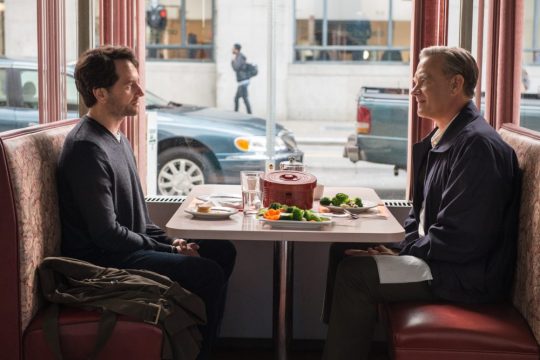
I re-watched this to make sure I wasn’t overrating it, but found myself every bit as moved, almost overwhelmed, as the first time I saw it. The confidence of Marielle Heller’s filmmaking is such that nothing ever feels forced, her themes never have to be underlined, nor does she ever have to draw attention to the quietly excellent below-the-line elements. Tom Hanks exudes warmth and compassion as Mr. Rogers, matched step for step by Matthew Rhys as the guarded, cynical journalist who resists the possibility of goodness and comfort with every fibre of his being. Some of the most masterfully filmed conversation scenes of the year - the diner sequence alone is extraordinary.
2) Parasite
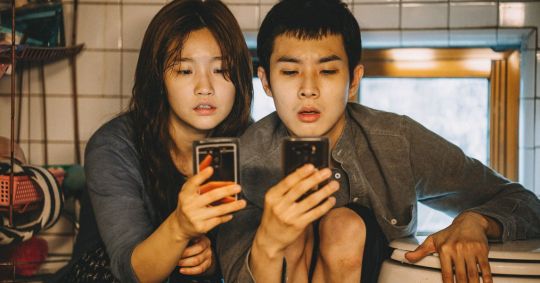
Hugely good fun, wildly unexpected, handles its tonal shifts fantastically with an ensemble cast that’s totally in tune to one another, and slickly channels the capitalist satire of Bong Joon-ho’s earlier films. It’s not that Parasite is saying anything that different or original necessarily, but it feels utterly of its moment and despite its anarchic energy is never glib or peevish. I squealed several times, laughed even more, and the film left me with a weird, immovable sense of melancholy. Deeply impressive.
3) Portrait Of A Lady On Fire
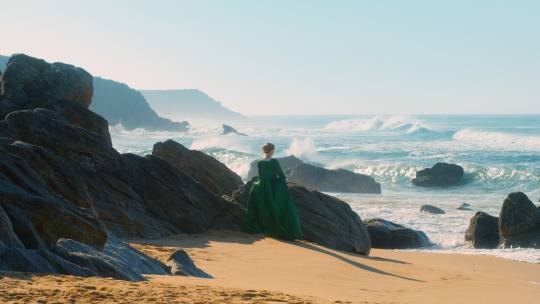
The range that Céline Sciamma has shown over just four films! Deliberately paced without ever feeling slow, I loved how invested this was in portraiture as an art form and how that folded into Marianne’s burgeoning feelings for Héloïse. Unlike a lot of other love stories, and by nature of its subject matter, Portrait is interested not just in how its two protagonists make one another feel but how they perceive one another. The ghostly apparitions that Marianne witnesses feel at first like a false note only for that to pay off beautifully in the final act. Héloïse’s final words are up there with The Lives of Others in terms of last lines that make you break out in goosebumps.
4) And Then We Danced
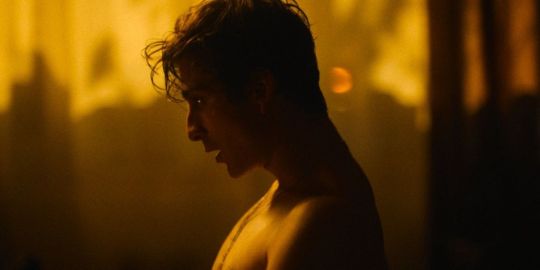
For a film that’s so concerned with the hard lines of its dance movements, it’s appropriate how tuned-in the screenplay is to when it needs to puncture its atmosphere of repressive masculinity with compassion and tenderness. Each relationship in the story is replete with texture and feeling, not just Merab’s rambunctious, chaotic home life, but also his dance partner / best friend. What really made the movie for me was how focused it was on Merab’s own journey, outside of and alongside his relationship with another male dancer.
5) A Hidden Life
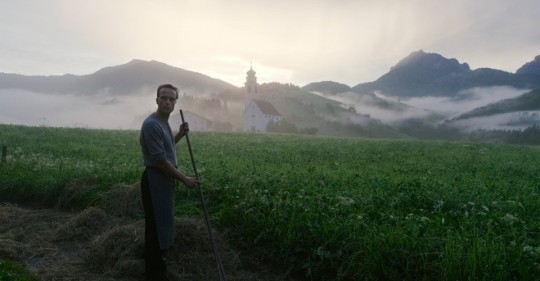
Malick is back, baby! Doesn't quite reach the giddy heights of his filmography up to and including The Tree of Life and the three-hour runtime is a little punishing, but Malick is clearly working with a renewed sense of focus and purpose. Tracking the life of Franz Jägerstätter, a conscientious objector who was executed by the Nazis in 1943, I was unexpectedly and profoundly moved by A Hidden Life’s spiritual curiosity. Franz's commitment to his faith might seem alien, but it becomes clear that it's the only thread he has to hold onto in order to see him through; even his relationship with his steadfast wife is defined by their shared religion. The roving camera and Jörg Widmer's stunning depictions of bucolic life turned sour, as the small village community become spiteful and cruel, also feel like some sort of spiritual rebuke (and it's notable that we're kept closely within Franz's POV rather than venturing out into the atrocities that lie on the margins of the film). I fully lost it when I realised that the title is taken from the monumental final paragraph of Middlemarch.
6) Never Rarely Sometimes Always
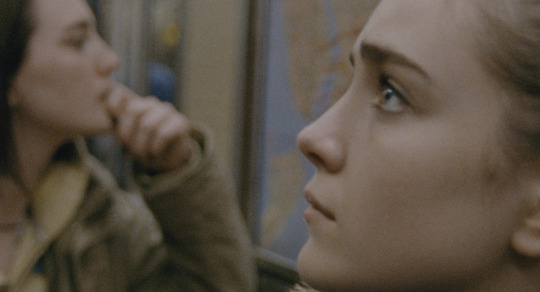
Eliza Hittman’s new film is definitely going where you think it’s going, but that hardly matters when the filmmaking and performances are this strong. Whilst it’s concerned with the difficulties of obtaining an abortion for vulnerable young women, that’s not all that’s on its mind, and I was struck by how well it draws the patriarchal society these two teenagers have to manoeuvre through every day. Hittman’s New York is a nightmare landscape, with Hélène Louvert’s cinematography expressively capturing the sense of oppressiveness and isolation that big cities can have on a person. Like with Beach Rats, Hittman draws fine performances from her leads, ones that say a lot with very little dialogue, and of course the scene that gives the film its name is just fantastic.
7) Corpus Christi

Somehow manages to overcome its reliance on coincidences in the early going to become an exhilarating, deeply-felt film about the failures of organised religion and the limits of faith. Bartosz Bielena could take me to church any day of the week, and he's truly electric as the ex-con who masquerades as the priest of a small town recently rocked by tragedy. The plot could easily be that of a Hollywood rom-com, and it's to the film's credit that, aforementioned coincidences aside, it's always interested in digging deeper. It's incredibly powerful as a testament to how difficult it is to confront the most difficult truths about ourselves and how grief is turned outwards. The visceral, upsetting fight scene that closes the film is memorable, sure, but it’s the troubled character study at its centre that ensures Corpus Christi lingers.
8) Boys State
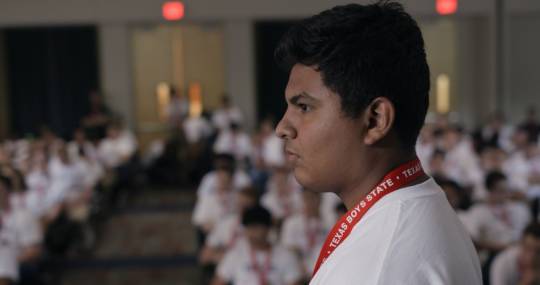
I suppose you might argue that finding a microcosm of American politics at an annual event where a group of 17-year-old boys are asked to form their own government is a little like shooting fish in a barrel, but directors Jesse Moss and Amanda McBaine mine their subject matter for much more than simple prescience. Impeccably cast and edited, it manages to be simultaneously hugely entertaining (with true heroes and villains) and also an insightful, terrifying window into the glibness with which white American men treat both real world issues and anyone on the other side of the argument. There were other, perhaps more accomplished documentaries released in 2020, but Boys State was so irresistibly of its time and so gripping because of that it kept creeping up in my estimation as the year wore on.
9) The Forty-Year-Old Version
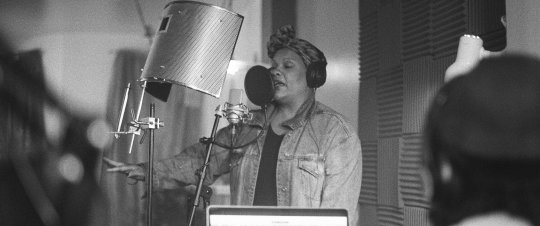
What a fun, smart screenplay this is. Which isn't to say there isn't plenty of other things that impress about this debut feature focused on an almost-forty-year-old Black woman who, frustrated with the dead end her career as a playwright seems to be facing, turns to rap as an alternative means of expression. It's incredibly astute on the ways in which Black artists are forced to compromise to appease white gatekeepers and perceived audiences, a topic that it handles with equal parts anger and wry humour. The film isn't blind, either, to the ways in which Radha's frustrations impact her relationships (particularly with her loyal agent/best friend). When the only complaint you have about a film is that it suffers from a surfeit of ideas, it’s indicative of what a special, unique voice it possesses.
10) Rocks
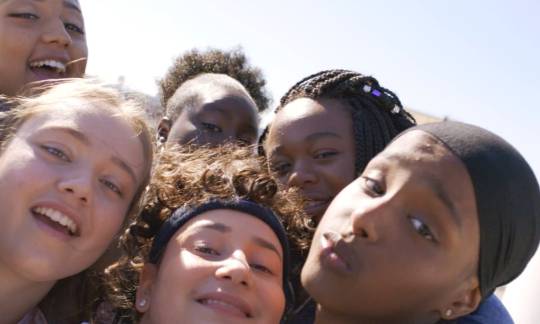
A huge step up from the stolid, dishwater-y Suffragette. The film’s deceptive simplicity in its depiction of a teenage girl and her younger brother who suddenly find themselves having to navigate an adult world they’re not ready for allows for the performances and screenplay to fill in the bustling, often joyful elements of Rocks’ life. Cast perfectly top to bottom, some of the film’s best scenes are where Rocks and her mates are just hanging out, shooting the shit with one another. And whilst there’s a heart-breaking centre to this particular story, it never feels reliant on pulling your heart strings, or leaning too heavily into the more troubling aspects of Rocks’ life.
Ten performances that I loved this year: Cosmo Jarvis in Calm With Horses, Joe Keery in Spree, Radha Blank in The Forty-Year-Old Version, Delroy Lindo in Da 5 Bloods, Bartosz Bielena in Corpus Christi, Cho Yeo-jeong in Parasite, Hugh Jackman in Bad Education, Alfre Woodard in Clemency, Johnny Flynn in Emma and Haley Bennett in Swallow.
6 notes
·
View notes
Note
What're the top lines* in the MCU that you think form the core of Loki's character? It's something I was thinking about when I saw a "I never wanted the throne..." gifset. (*For arguments sake, you could go with top 3 or 5 or WHATEVER)
oh boy I like this question. what a good question thank you for asking
(couldn’t narrow it down to 3 or 5, though, so I’m going with 8.)
1. “I never wanted the throne, I only ever wanted to be your equal!”
You mentioned this one, but it is absolutely a central piece of Loki’s character - the idea of wanting to be Thor’s equal, of his feeling of being lacking, of being less, and how that has shaped him, beyond what we see on screen. The throne isn’t an end in and of itself - it is symbolic. Its meaning is of finally reaching the place that Thor has automatically. Of being equal, because the marker of that is Mjolnir and the kingship, and since Mjolnir is an impossibility at least he can be worthy in another way.
It ties into Loki’s illusion in the deleted scene from The Dark World - he’s not imagining himself as king, there, so much as he’s imagining himself as Thor, down to the red cape and the hammer. Loki doesn’t want to be himself on the throne - he wants to be Thor. Because anything else means he will always be less.
2. “Trust my rage.”
There’s two reasons I chose this one. The first is Loki’s anger - Loki has a lot of anger, a lot of rage, through the first three movies in which he appears. Again and again it’s there, the seething fury just barely suppressed most of the time (more on that later) but still very much present.
The second is the choice here that chooses “rage” over “grief.” Loki’s decision to go with Thor comes just as much from his grief over Frigga’s death (and guilt) as it comes from his anger and desire for vengeance - but that’s not the road he chooses to take. Because that would involve a vulnerability that Loki is never willing to show. It would involve giving Thor a genuine emotional piece of himself that Loki refuses to give.
I’ve talked a lot before about how the Odinfamily in general (specifically Thor, Loki, and Odin) transforms their emotions into anger because it’s an acceptable feeling (as opposed to sorrow or depression). That’s part of what I think is going on here: the assumption that Thor will more readily accept Loki’s thirst for vengeance as a foundation of trust, however tentative, than he would accept their shared grief.
3. “I remember a shadow, living in the shade of your greatness.”
This kind of lines up with the first one above, but it shades a little differently - fitting to where it falls in canon, it’s more bitter, it’s darker, it’s less plaintive (”this isn’t what I want”) and more ferocious and angry. It encapsulates Loki’s perspective on their places, once again underlining that sense of being a shadow, being cast in Thor’s wake as the lesser. And it has weight, too, in the sense of…not just a shadow in that he’s obscured from view, but as in a shadow as the counter to Thor’s light. You only get a shadow with sunlight - as the sun shines on Thor, Loki gets cast as his dark counterpart.
If I push this a little further: dark, distorted, blurry, and not a constant - Thor is always there, but Thor’s shadow isn’t.
And that’s the role Loki has cast himself in in The Avengers: the villain, Thor’s shadow, his dark counterpart. If Thor is the hero then Loki is the monster. Because that’s his role. Thor’s shadow, both in following him and in making him look brighter by comparison.
4. “Your ledger is dripping, it’s gushing red, and you think saving a man no more virtuous than yourself will change anything? This is the basest sentimentality. This is a child at prayer… pathetic! You lie and kill in the service of liars and killers. You pretend to be separate, to have your own code. Something that makes up for the horrors. But they are a part of you, and they will never go away!”
Okay, so, multiple people have talked about the ways in which Loki is talking as much about himself here as he is about Natasha, and I think that’s absolutely accurate, from “basest sentimentality” (Loki’s repeated references to ‘sentiment’ throughout this movie are very ‘doth protest too much’) to “they are a part of you, and they will never go away.”
But almost more than the words themselves what’s telling to me about this monologue is the way that Loki absolutely loses it. Because the thing is that we don’t see Loki like this very often at all - really flipping out, losing his control, displaying the kind of violent anger that he does to Natasha here. Even in other places when he’s angry, he either doesn’t raise his voice this much or doesn’t get physical. The other place I can think of it happening is in Thor, at the end, with the fight on the Bifrost when Loki is dissolving and basically trying to goad Thor into a fight with him (for about six different reasons).
And it is very, very interesting that it happens here, during a speech that’s seemingly just oriented toward scaring Natasha. Because, yeah, the other place it happens is when it’s Loki having a full mental breakdown and identity crisis.
Something here snaps. And I think it has to do with the way that, when Loki starts in on Natasha, it starts a resonance with his own feelings of monstrosity. And that’s still a very, very sore point.
There’s almost a satisfaction when Natasha confirms that. When she calls him what he is.
5. “It hurts, doesn’t it? Being lied to. Being told you’re one thing and then learning it’s all a fiction.”
This line is…it fascinates me because of the way that it, like a lot of the things Loki says (and another later entry on this list) has two edges. On the one hand, Loki’s gloating: “now you get it, now you know what it’s like to be me, how about that, Thor, how does it feel.” There’s still an anger and a bitterness there, a vindication.
But at the same time, and almost in the next breath, it is also, under that edge of spite, an extended hand. This is where Loki makes his offer to Thor to join him, to work with him and be allies on Sakaar. Loki has no interest in going back to Asgard or fighting Hela. But he’s willing to bring Thor with him as he tries to gain a foothold of power there.
And there’s an element of being pleased that he can do that - in being in a position, finally, where he has the edge on Thor, the superiority to Thor, where he can be the one to offer a helping hand. That’s power, and Loki likes feeling powerful. (He’s spent a lot of time feeling powerless.) Simultaneously, though…I think it’s also what Loki wanted someone to do for him, when his life fell apart. Would have wanted Thor to do for him, though he’d never have asked.
All this happening at the same time, and in a few brief moments - and that’s a big part of how I conceptualize Loki. There are a lot of things going on in his head at the same time, all the time. And sometimes he doesn’t even know which is foremost or most true.
6. Thor: “Why have you done this?” / Loki: “To prove to Father that I am a worthy son! When he wakes, I will have saved his life, I will have destroyed that race of monsters, and I will be true heir to the throne!”
I feel like…people who think Loki’s motive in Thor is just “usurp Thor and the throne” really are not…paying attention. Because this line really says, right out, what Loki wants. “To prove to Father that I am a worthy son.”
And on top of that…it’s that inward-pointing self-hatred, there, implicit in “that race of monsters” - Loki has already referred to himself as such once (”the monster parents tell their children about at night”) and here he’s distancing himself from that but at the same time…he knows he’s one of them. And yet it’s like if he kills all the rest that won’t matter.
He’ll still be the true heir, he’ll be worthy (and what a weighted word that is, in the context of Mjolnir), and Odin will see him as more than a potentially useful trinket.
And in some ways everything Loki does after this ties back to a reaction to this line, here, and his failure to prove that he is worthy. A reaction against that failure. A determination to, if he can’t be a worthy son, at least be a better monster.
7. “You’re my brother and my friend. Sometimes I’m envious, but never doubt that I love you.”
Like above, this is another line that’s double-edged - it’s both sincere and not. Loki means it - he’s envious, but he does love Thor, very much, terribly much, and that never changes even when he hates him.
At the same time…Loki is planning, in this moment, to ruin Thor’s moment of supposed triumph. He’s already set things in motion for the Frost Giants to invade, and for Thor to retaliate and disobey Odin and therefore show that he’s not worthy of the crown.
Definitely didn’t plan on them actually making it to Jotunheim, let alone starting a fight there. At that point Loki’s plans went thoroughly sideways.
But basically…it’s the way that even as Loki’s telling the truth about loving Thor, he’s setting him up for failure. And that is very Loki - for both those things to exist side-by-side in the same moment.
8. “Satisfaction’s not in my nature.”
This line!! I come back to this line so much as something that defines my understanding of Loki’s character, because it says so much in five words. Because Loki is someone who is perpetually unsatisfied, who is restless and can’t settle and doesn’t know what he wants and doesn’t know who he is, who is always chasing something and never happy when he gets what he’s chasing.
Because what he keeps doing is chasing the wrong things.
Loki spends so much of canon twisting on a hook of his own making, looking for one thing after another - Odin’s approval, the throne of Asgard, mastery of Midgard, spiting Thor - and none of those things make him really happy. Because on the one hand, Loki doesn’t know what he wants, not really. And on the other hand there’s always a thirst for more.
Loki scrabbles and struggles and fights, and almost never stops. Complacency is anathema. On a good day, that’s drive and determination; on a bad day it sends him spiraling.
#led lite#conversating#long post for ts#loki trashblogging#loki's a goddamn mess#loki laufeyson#i'm proud of this ok
130 notes
·
View notes
Text
LITTLE CHARACTER THINGS
Just a fun little character game. Fill in the below categories with 3-5 things that your character can be identified by. Repost & tag away !
TAGGED BY: @reantte & @chaoswilled, who both like to see me suffer. TAGGING: it’s a wonderful meme thus I encourage you all to go ahead & steal it [just tag me when you do]; @handspoken / @balletshoes, @huntershowl, @kissafist, @spiraledheart, @mettatoniic, @inhumanistic, @breselin & @carvedbones get a tag nonetheless.
EMOTIONS / FEELINGS:
001. Nostalgic; struck by an all-consuming kind of grief.
002. Passionate, severely dedicated.
003. Compassionate; loving & caring fiercely.
004. Insecure; self-depreciation is her greatest vice.
005. Courageous, recklessly so.
GREETINGS:
001. a small wave, brisk & efficient.
002. a handshake, maybe; usually of the awkward kind.
003. a petite nod, occasionally; whenever she is busy or otherwise occupied.
004. greeting someone by saying their name or an enthusiastic “hello / good-morning / good day” etc.
COLOURS:
001. pastel pink, any shade of pink & even red really, but its pastel version holds the greatest value.
002. peach; perhaps even shades of orange.
003. (pastel) blue; several shades thereof. Turquoise & a tint of green.
004. ivory; see her skin, the base colour of sheer fabric.
005. grey & variations thereof.
SCENTS:
001. freshly washed laundry.
002. the ocean; the scent of the sea.
003. lush forests; a Spring breeze, bit of an earthly hue.
004. flowers; anything rose-y, really.
005. polished steel.
CLOTHING:
001. as a servant / Homeworld: typical leotard & sheer skirt + ballet slippers kept in white, black & shades of grey (while serving White Diamond), later frilly, multi-coloured dress with sheer fabric wrapped around her hip & a pink underskirt, ballet slippers & juvenile, “rosebud” shaped hair (while serving Pink Diamond).
002. during the rebellion / War for Earth: major change in attire; tight grey sheer top + blue vest underneath combo, peach coloured shorts & orange-tinted boots; sleeveless. Wild, unkempt hair resembling her earlier “rosebud” cut but far more dishevelled; sabre in hand.
003. post-war: hair a tad more ‘tame’, same tight shirt & shorts combo but a shift in colour with sheer sleeves + overthrow worn across the shoulders. Legwarmers paired with ballet slippers, heart-shaped cleavage.
004. post Rose’s death: same shirt with slight variations; star on her chest, sleeves again gone. Colour shifted to bright turquoise with sheer skirt & pastel coloured shorts worn underneath (reaching down to her knees), low cut socks + ballet slippers, very, VERY neatly kept hair with not a single strand out of place. Later, she dons a swift alteration thereof; the star on her chest is more strikingly depicted, sheer skirt replaced by a ribbon / bow tied around her hip; yellow shorts instead of pink. Hair a tad more unkempt.
005. post “CYM” / Future: wears a denim-esque jacket with a star on her back. Long, high cut trousers revealing her shins in addition to pink ballet slippers. Wears a turquoise, shoulderless top underneath the jacket with a heart-shaped cleavage. Hair resembles her war-haircut; more dishevelled, rebellious.
OBJECTS:
001. various swords & sabres neatly cared for & stored either in her gemstone or room. She has amassed quite the collection of ancient & legendary weapons over the centuries, ranging from simple marine sabres & battle axes to Excalibur (which she, at some point, pulled out of the stone).
002. her gemweapon, aka lances & variations / modifications thereof.
003. a mobile phone she got shortly before “CYM”; one of the few items she does not store in her gemstone.
004. dried roses at the back of a journal; one she wrote & sketched in back before the war. Hidden deep within her gemstone.
005. an array of other, different items stored in her gemstone (first-aid items, car keys, tools, various instruments, telephone numbers, various weapons such as shotguns, etc).
VICES / BAD HABITS:
001. Inferiority Complex / Low-Self Esteem. Pearl automatically deems herself inferior to others or simply not good enough, falling victim to hysteria whenever failing to succeed on her first try. -- this usually triggers sentiments of extreme self-decrepitation or emotional fits. Additionally, these feelings of deeply seated insecurity & self-hatred turn her bitter / petty & coerce her to crave validation in any shape or form. She can come across as a know-it-all, as condescending or arrogant given how she will continuously bring up her achievements, knowledge & countless justifications as to why (e.g) she did what she did or why sth. did not work to counter these ever-looming feelings of utter worthlessness.
002. Obsessive / Borderline Neurosis. A vice that goes hand in hand with 001; Pearl is obsessed with the past (may it be in the shape of mistakes or ‘happy memories’), symmetry, cleanliness & people per se; especially Rose has always been a sore topic in that matter. In fact, her obsession went as far as to turn into a serious neurosis / the unquenchable urge to hyperfixate on something & mercilessly obsess over it in turn. Without something to obsess over, Pearl breaks apart. While she loves fiercely, this kind of behaviour is prone to “smother” those in her care. May it be through overprotectiveness or overly critical / a “mother knows best” kind of demeanour.
003. Terrible Coping Mechanisms / Living in Denial. Pearl is guilty of “trauma compartmentalizing”; she represses her traumatizing experiences & memories in a self-destructive way. As demonstrated in “A Single Pale Rose”, her mind is structured in layers; the deeper “in” you go, the more she unravels & falls apart; on the surface, she tries to keep it all together but is well-aware of the mess waiting on the brink. -- Pearl additionally keeps amassing problems / trauma rather than facing any of them.
004. Stuck in the Past / Unable to Let Go; Probably a given one that does not require further explaining given what I already detailed further above. -- ever one to fondly remember the War & the role she had in it, she cannot let go of what once was. This is especially true whenever the casualties of war (guilt complex) or Rose Quartz are concerned; the latter coerced her to live the greatest half of her life (post Steven’s birth) trapped in a perpetual state of grieving & yearning for all she has lost.
005. Liar / secretive. Pearl has been prone to lie & twist her words ever since she was given to Pink Diamond 8000 years ago. What started as an attempt to protect Pink from the Diamond Authority soon turned second nature. While she usually lies out of a good reason, partially due to having been “forbidden” to talk about certain matters, lack of social skills + her compassion & eager will to spare e.g. Steven from harsh truths or to protect herself, it is a terrible vice she cannot shake.
BODY LANGUAGE:
001. gestures quite a lot; may it be with her hands or expressions. Usually underlines her points by sweeping arm or hand movements; prone to “put her whole body into it”.
002. Arms wrapped around her body, predominately her waist. Usually a sign of discomfort or tension that she simply cannot brush aside. Often paired with her glare wandering aside / avoiding eye contact.
003. Broad stance / legs apart as opposed to her feet usually positioned in First Position. Radiates rare moments of confidence, often paired with her hands either on her hips or wrapped around her lance / sword. She usually places said weapon on her shoulder or sprawled across it.
004. Head held up high (e.g.: confident / disapproving) or head kept low (e.g.: insecurity / doubt); a gesture often affecting her entire stance - spine straightened & shoulders squared whenever poised, posture hunched whenever insecure.
005. balled fists out of anger / arm lifted & body positioned in front of someone she ought to defend.
AESTHETICS:
001. The Art of Slowly Falling Apart. “everything is perfectly fine”: a cursed phrase on the tip of your tongue; repeated endlessly. The paradoxical sentiment of deeming onself above all else. -- above the past, the pain, your former life -- & failing to realize that you are anything but, that control has long slipped from your grasp; that threads hold your broken self together, that you are so close to falling apart & yet play pretend.
002. All-Consuming Love. ever devoted, passionate / obsessively loving with all your heart. The yearning, mutual & unconditional dedication to something beautiful but fragile. You live in a fantasy alongside her / the kind you dreamt about ever since you freed yourself from Homeworld’s shackles. -- it is the kind of love that demands & demands & demands all you willingly give.
003. Dance. a part of your very identity, even the part of the past you ought to loathe; a fact that leaves you aching. It is embedded in your very code. A love for beauteous choreographies even integrated into melee combat; pristine, elegant, flawless; dancing to the mellow melody of some piano piece playing in the background.
004. the Ocean. may it be the aesthetic of giving oneself to the depths or wuthering emotions crashing down threatening to smite you into pieces / but also its power, the very effect the scent of salt & the sound of cascades have on you. -- something you ought to oppose but can’t.
005. the Battlefield / Revolution. swords clutched in aching hands; breathing heavily. The thrill of battle, the dirt under your nails; ever listening to the beating of a drum at the back of your head. You are Fire, Passion incarnate: cutting the cord, shattering those that wronged you, overcoming opposition & the conditioned voice inside your head, fighting against all odds / one step away from a cracked gemstone. Breaking the chains, literally.
SONGS / PIECES:
001. Running up that Hill -- Kate Bush.
002. Both Sides Now -- Joni Mitchell.
003. Eight -- Sleeping At Last.
004. Romeo -- Until the Ribbon Breaks.
005. My Boy Builds Coffins / Blinding / Over the Love -- Florence & the Machine.
Bonus: Cut the Cord -- Shinedown; not her style but boy does this give me Renegade Pearl vibes.
#[[ I am cheating in the music section I know I know#but I just have so many songs I relate to Pearl#hence why I did not list any pieces#even if I could write down a million gah. But yeah I got carried away again as per usual. Mobile users pls forgive me. ]]#vii. 𝗷𝘂𝘀𝘁 𝗮 𝗽𝗶𝗲𝗰𝗲 𝗼𝗳 𝗮 𝗴𝗿𝗲𝗮𝘁𝗲𝗿 𝘄𝗵𝗼𝗹𝗲.
7 notes
·
View notes
Text
The Role of “Hate” in Pluto
I have just finished Pluto and one of the things I found the most interesting about it is how it explores the concept of “hate”.
The ending is very clear in its condemnation of it:
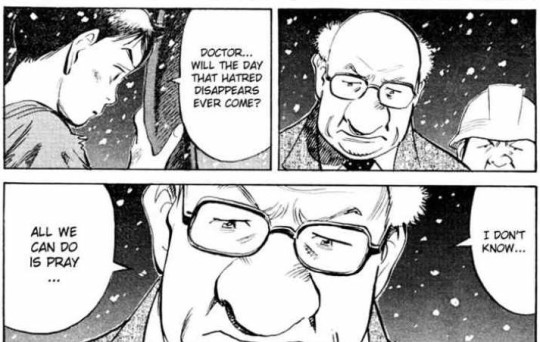
However, more than this, what I find fascinating is how the story arrives to this point and what this conclusion means. As a matter of fact hate and other negative emotions like sadness, anger and grief are all portrayed as very human emotions which are very common and difficult to avoid. So, this meta will try to explore this idea further.
Pluto is a retelling of one of Osamu Tezuka’s stories which is called The Greatest Robot on Earth.
Because of this, I think that a good way to go at it when analysing it is to ask ourselves what the greatest robot on Earth should be like.
This is professor Tenma’s answer:
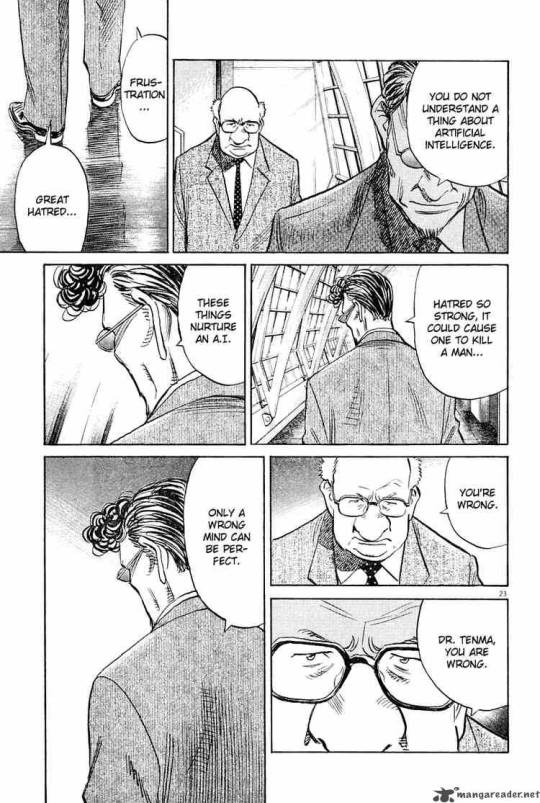
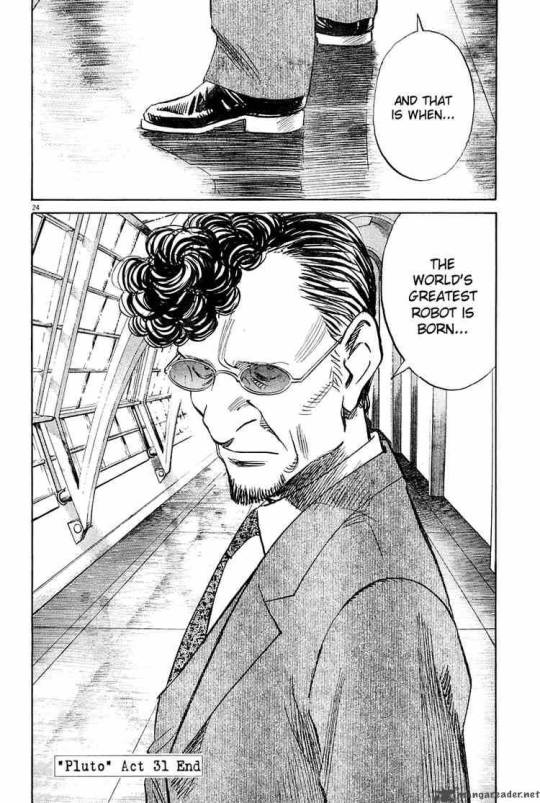
As a scientist Tenma wants to recreate human nature through an AI. Humans hate, feel sadness and lie, so a perfect robot should be able to do these things as well.
Let’s underline that this idea which is fully expressed by Tenma is prepared throughout the narration in several ways far before Tenma makes it explicit.
For example, Brau 1589 states that no malfunction has been found in his AI. This is because him killing a person does not make him less perfect, but actually better than other robots because it makes him closer to a human. This is once again clarified by Tenma when he visits the robot:
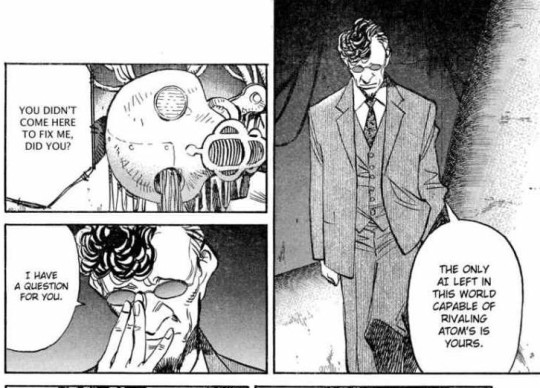
Similarly, Atom says something interesting here:
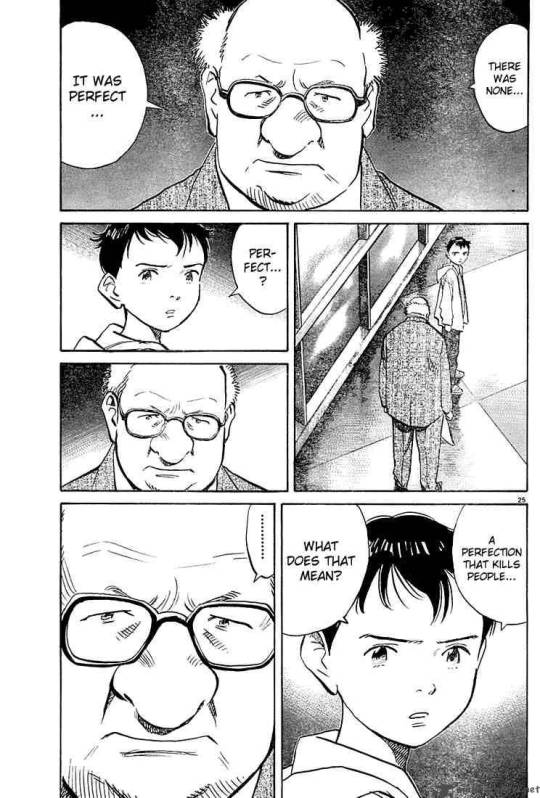
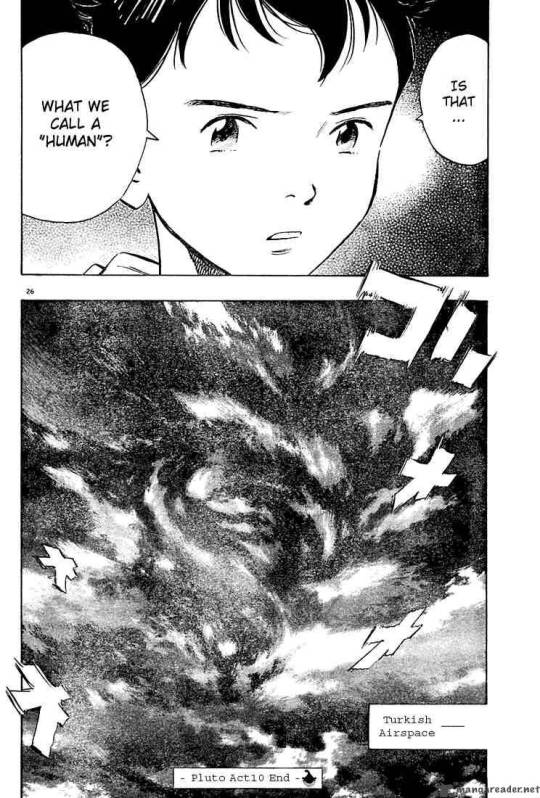
On a less darker note, the narrative offers several examples of minor human weaknesses robots are not supposed to share:
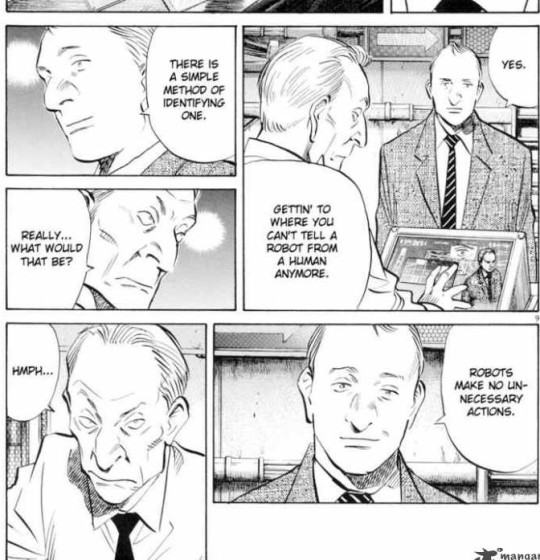
In a conversation he has with Gesicht, Hoffman states jokingly how a robot who skips work could be considered progress. This is perfectly coherent with the ideals embodied by professor Tenma’s character.
This idea might seem to endorse a pretty negative perspective of human nature. This is certainly partially true given Tenma’s cynism and his status as a person who has escaped from society and so who avoids interactions with other human beings as much as possible.
However, when it comes to Tenma, I think that what he thinks about hate and human imperfection is something a little more complex than that:
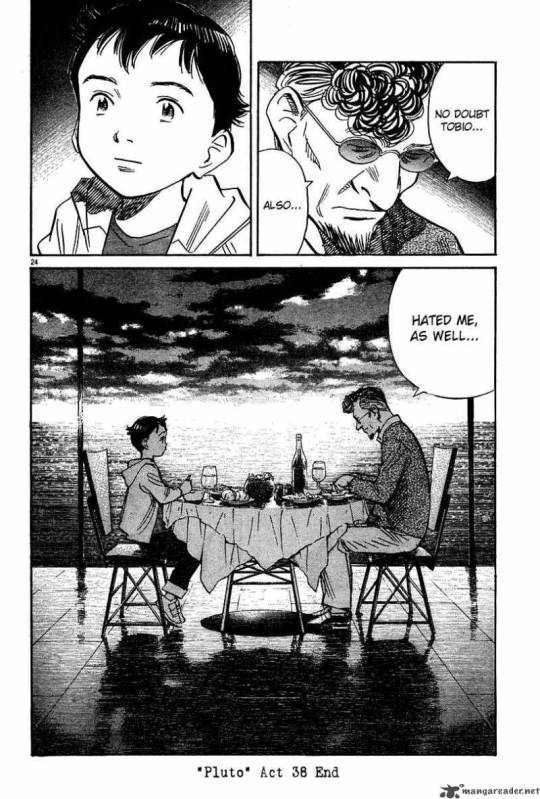
Tenma created Atom to somehow “resurrect” his son who died in a car accident. However, he soon realized that Atom was not Tobio. First of all he does not mature like human children do:
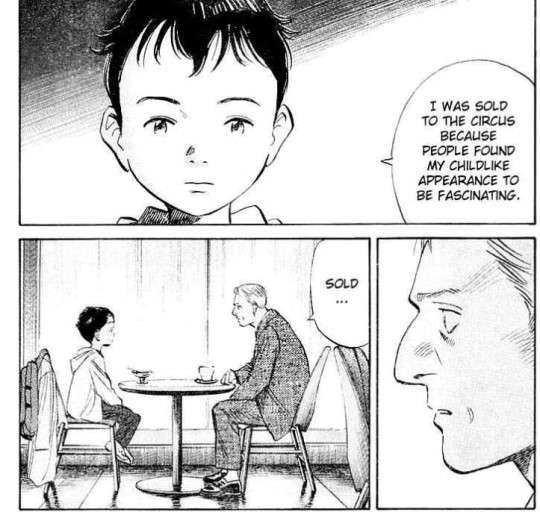
Secondly he doesn’t share Tobio’s feelings and imperfection. He can try to imitate them, but when it comes to a feeling as complex as the one of hate he doesn’t know what to reply to Tenma.
So, for Tenma the negative traits which made Tobio human are the ones he misses the most and Atom lacking them is why he decides to sell him and to leave him behind.
This is to highlight how Tenma’s vision of the world is not simply one driven by scientific curiousity and a sense of nihilism. Those two are aspects definately present in him and they make up a great part of his personality, but they are rooted in Tobio’s death and in Tenma’s inability to overcome grief:
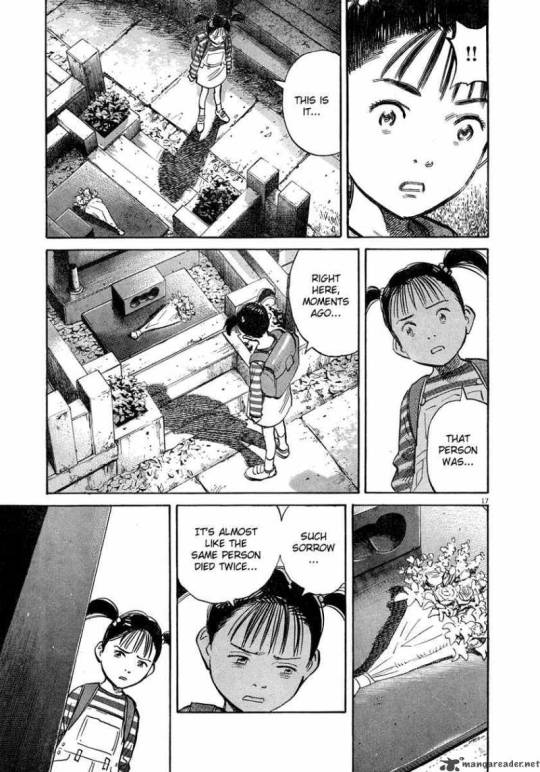
This is made clear by Tenma’s reaction to Atom’s death and to his willingness not to respect any moral or scientific bounds in order to have him back:

Here Tenma is doing something very similar to what he did when Tobio died. He chooses to do what he can to bring his son back even if he knows that he might be giving birth to a demon.
This is important when we consider Gesicht’s story and his role.
Gesicht, like Tenma, is a father who lost a son in a horrible way. His reaction to this loss was pure anger and hate for the child’s killer. The hate was so strong that motivated him to kill a human being despite this going against the robotic laws. It is obvious that if one takes out the fantascientific setting the situation is already one with which we can empathize. Gesicht is portrayed as a very moral person. This is no surprise since he was programmed to be a robot cop. However, when a great injustice hurt him personally he gave in to revenge and broke the law. This is the core of Gesicht’s character and his struggle.
This is important for at least two reasons.
1) The first one is that Gesicht killing the man out of hate is relevant when it comes to his and Mr Haas’s subplot:
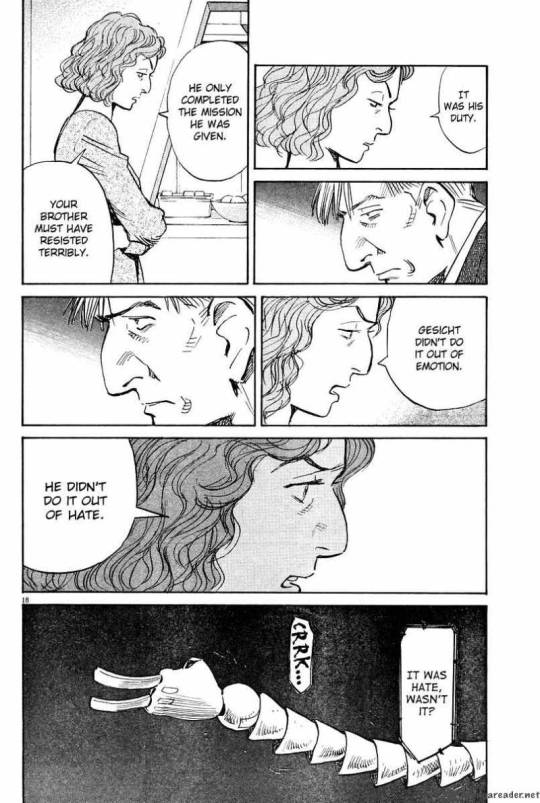
Mr Haas’s wife suggests that Gesicht (being him a robot) could not have killed Haas’s brother motivated by such a negative feeling as hate. She argues that what happened must have happened out of necessity while Gesicht was trying to fulfill his duty.
The idea that robots not having emotions can be considered something which makes them better than humans is touched on several times. Here is an example:
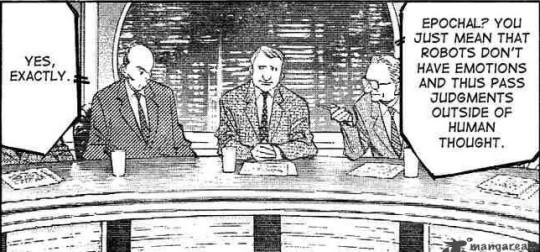
A judge whose judgment is not clouded by emotions can be considered better than one who can become irrational due to feelings.
In short, it seems logical to think that Mr Haas’s anger towards Gesicht would be misplaced if the robot killed without hate and justified if the robot killed with hate.
However, this is not how things play out in the end.
As a matter of fact it is specifically the fact that both Haas and Gesicht acted moved by hate that lets them understand each other:
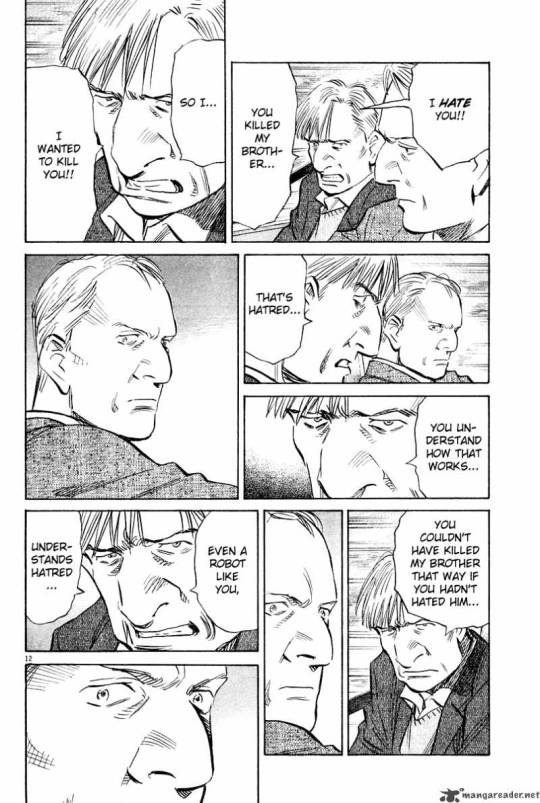
Finally, it is the fact that Gesicht still chose to protect both Mr Haas and his family despite what had occurred between them what finally motivates Mr Haas to change idea about him and hopefully robots in general:
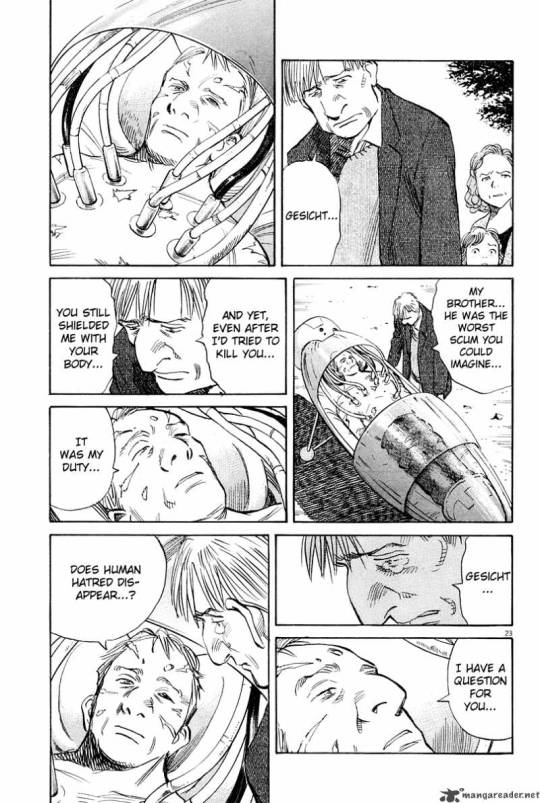
In other words, it is not the fact that Gesicht is unable to feel hate which makes him better than Mr Haas, but the fact that he was able to overcome it. This is what gets through to Mr Haas and inspires him to be better. After all, if Gesicht was simply a person without emotions it would be difficult for Mr Haas to relate to him and it would be easy for him to keep hating the robot as someone inhuman. However, the fact that the two of them are flawed in a very similar way, but that Gesicht still chose to abide to some sort of moral code (like his duty as a policeman) is the proof that Mr Haas has the chance to do the same.
The way things were sorted out between them makes sense also considering Mr Haas’s backstory. As a matter of fact his and his brother’s hate for robots was born by the fact that they were considered better workers than humans and that this led to the brothers’ father being fired. What is more a robot’s too strict application of the law is what led to the man’s death:
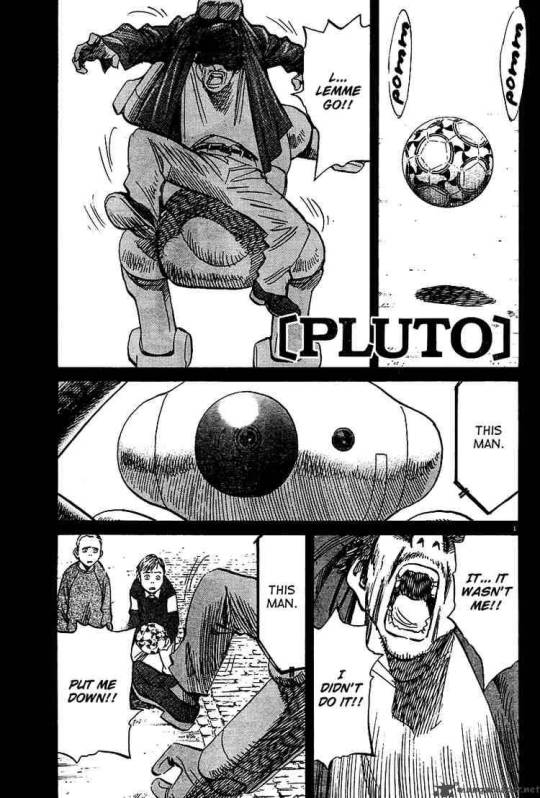
The robot was technically right since the brothers’ father had stolen, but at the same time all he stole was a ball to give his children some joy.
In other words, arguments about how robots are better than humans and superior to them are bound not to have the right effect on someone like Mr Haas since his hate is born partially by this exact idea. However, seeing how similar to him Gesicht was managed to obtain some results.
2) The second reason is this:
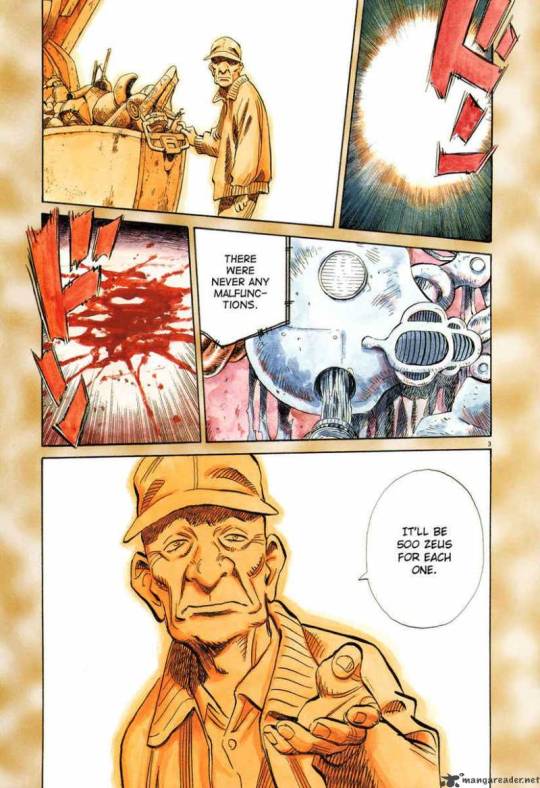
Throughout the story this scene seems to be a part of an extremely dark memory Gesicht is trying to suppress. He is literally haunted by this scene and it keeps coming to his mind when he sees robots’ bodies among other things. In short, everything leads the reader to think that what happened between Gesicht and the man asking money out of him is something negative.
However, when we are finally revealed the context of the scene this is what we discover:
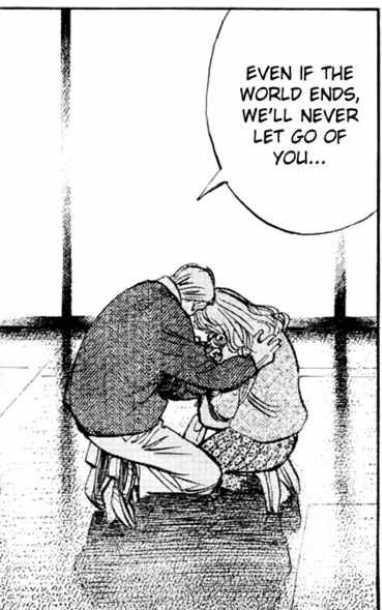
Gesicht’s memory was not an unhappy one, but on the contrary it was him remembering the day he became a father. In other words it is the day Gesicht learnt parental love.
At the same time this scene is at the origin of Gesicht’s hate and violent action. As a matter of fact one can not choose to only have positive emotions. If one feels he is bound to deal with both the good and the bad of it:
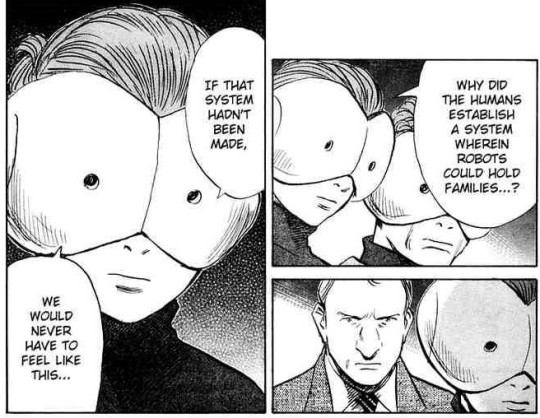
All in all the story if full of love being used to fuel hate and of hate overcome by love.
This becomes apparent in the character of Sahad aka Pluto:
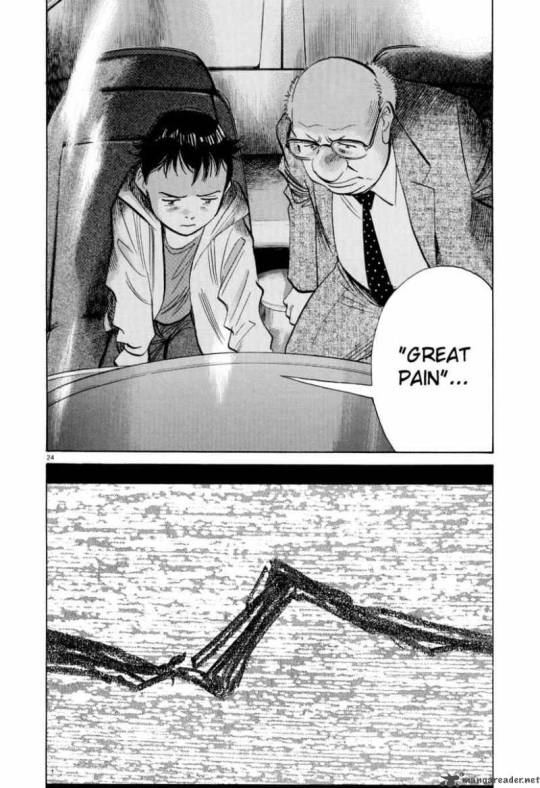
This abstract sign is identified by Atom as a negative feeling and when we meet Pluto for the first time he has been realizing works of abstract art:

This picture might seem chilling at first sight especially if the reader realizes that the robot who has drawn it is Pluto. Uran herself is led to Pluto because she can feel his immense pain and she wants to help him.
However, as Sahad spends more time with Uran in a somehow positive environment he starts to remember what he was originally created for aka his father original wish:
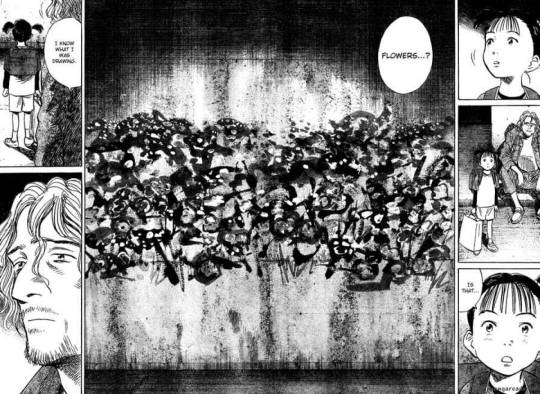
And so what seemed like an abstract mirror of a pained subconscious becomes a wonderful field of flowers able to move Uran to tears.
After all, the whole conflict is born by a huge dream being destroyed by war and by a man losing his children and his wife.
What Abra/Goji wants is revenge and it is meaningful that he tries to obtain it through three cyborgs (counting Goji himself) who were originally created to turn the desert into a field of flowers.
The example of Bora is self-explanatory:
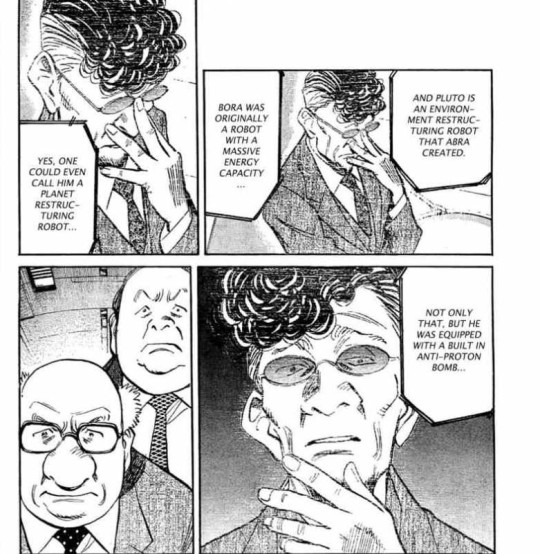
He was supposed to be a robot who could save the planet, but he has been turned into a weapon which could destroy humanity instead.
In short, negative feelings are a part of being humans and they are strongly intertwined with positive ones. These two points come together in Atom’s “resurrection”. This part of the plot is also linked to Gesicht’s arc and his role as a father.
Atom is able to wake up thanks to Gesicht “hate” and Epsilon’s “sadness”:
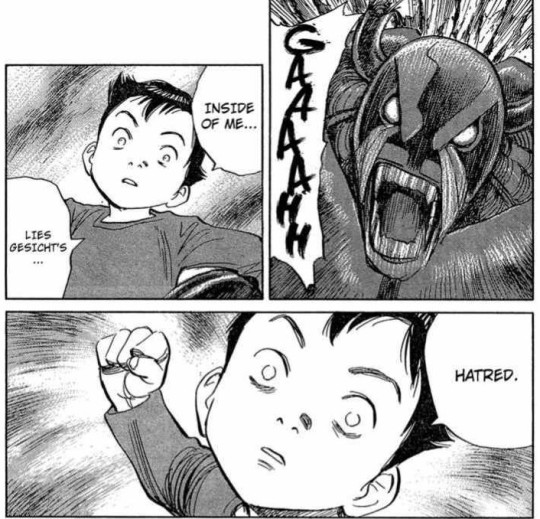
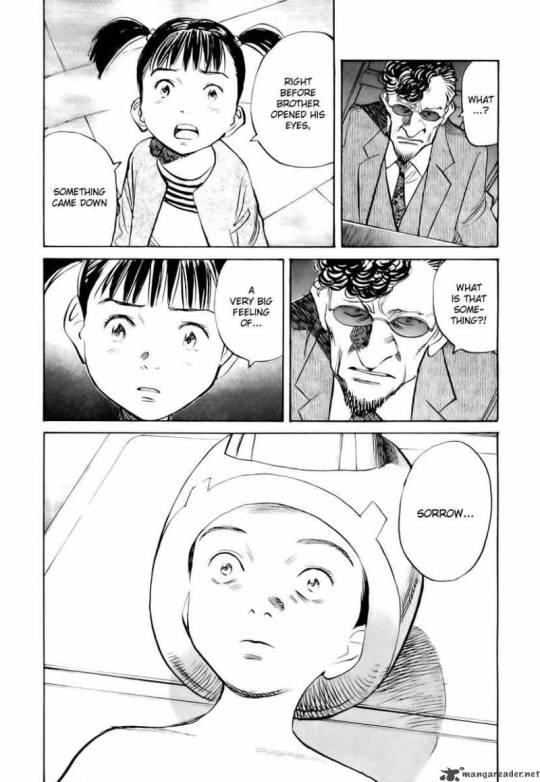
After his awakening he is said to be able to feel hate and this is proven true during his battle against Pluto:
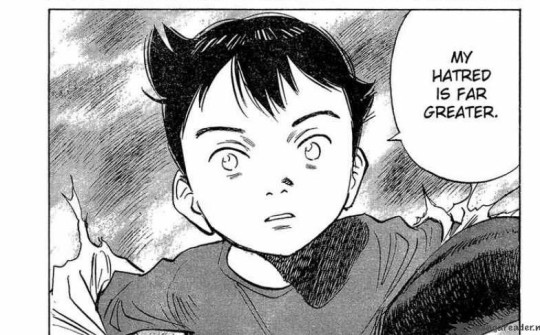
This in itself is important and can be used to make some considerations:
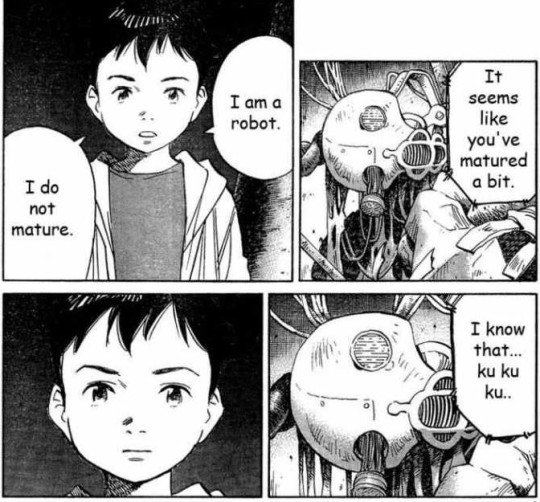
Here Brau claims that Atom has matured to which Atom’s reply is that he can not grow since he is a robot.
This is interesting because the fact that Atom can not grow is one of the reasons why Tenma realized that he was never going to be like Tobio. The other one was Atom’s inability to feel hate. These were the two main reasons why Tenma considered Atom a failure.
However, after his awakening Atom has learnt what hate is and he is said to have matured. What Brau noticed was probably something more similar to a change happened in the inside rather than one happened on the outside.
In other words Atom has grown not because he has matured physically, but because he has now a better understanding of human emotions among which hate.
This is no different than a child growing up and having to learn the complexity of the world and to make sense of their negative feelings.
After all, given Tenma’s description of the perfect AI here:
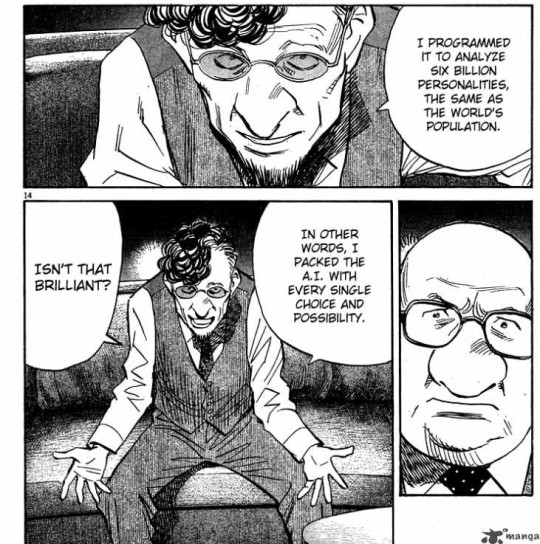
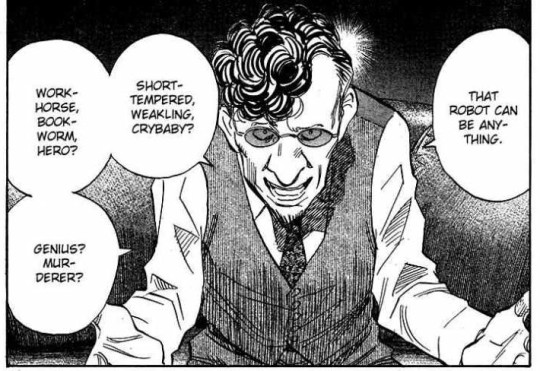
It is difficult not to think of it as a child aka as a being who has in front of themselves all the possibilities and who will grow to become only one of those possibilities.
In a sense this is very similar to what was said in Monster:
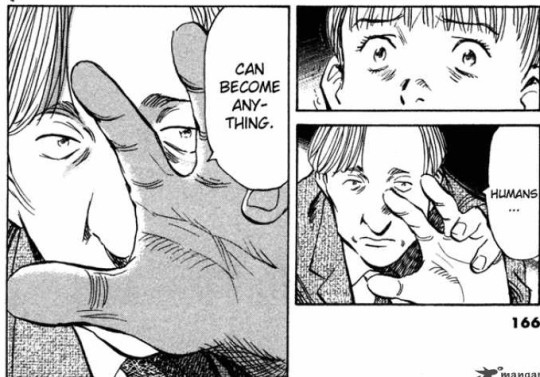
Children can become anything and the parents have a great role in influencing their future developments.
This becomes obvious through Gesicht and Atom’s relationship.
As a matter of fact what Atom learnt from Gesicht is not only what hate is, but also this:
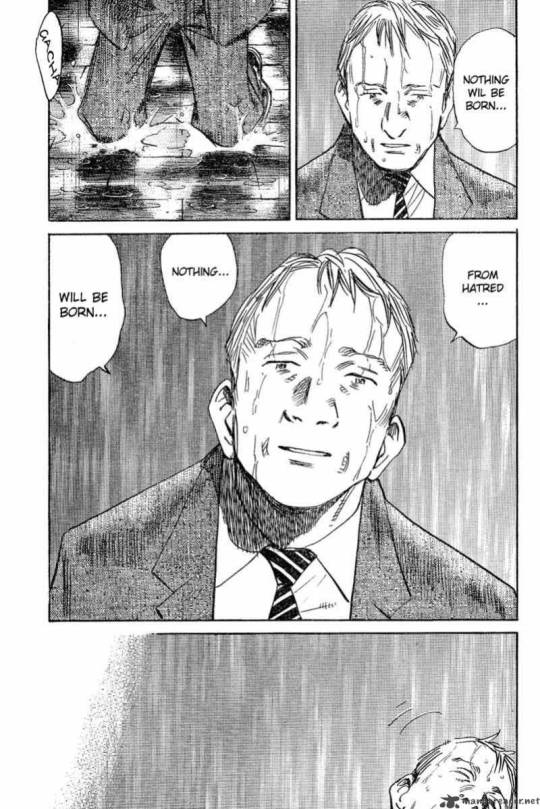
He learnt how to overcome it and that humanity is not just hate, but also hope:
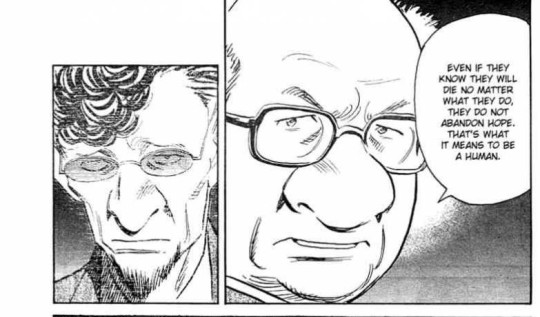
This is why the manga ends with a wish and a prayer which are actions born out of hope:
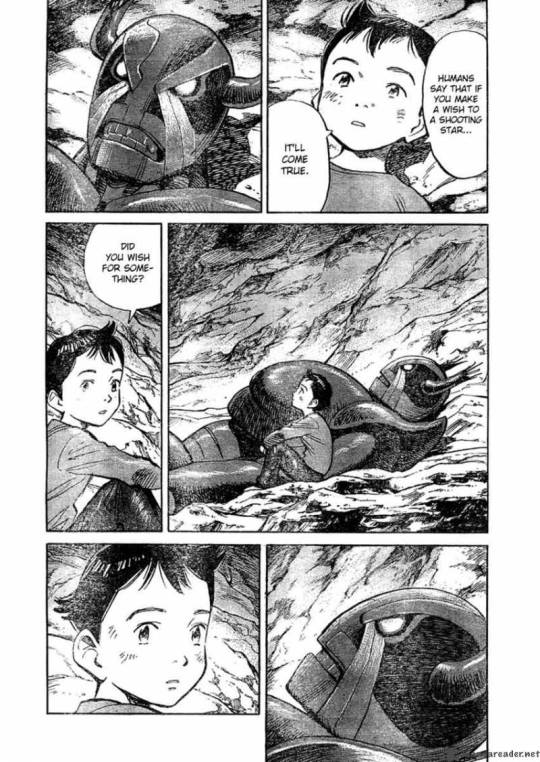
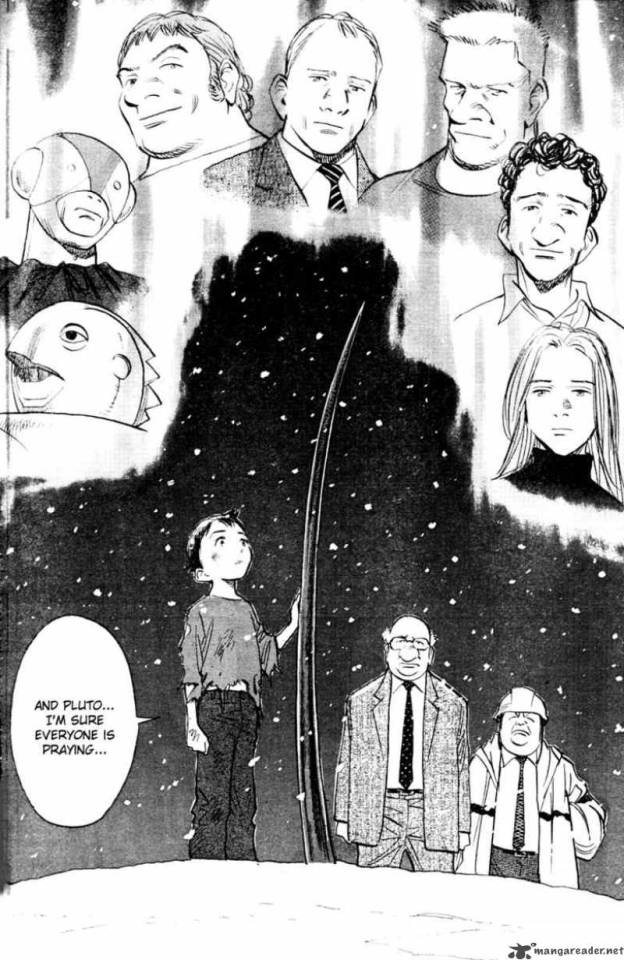
Let’s also underline how the bomb formula Atom writes down after he wakes up is not just something born out of a new found hatred for the world, but it is probably something he learnt thanks to Epsilon who realized that the Earth was in danger just before dying:
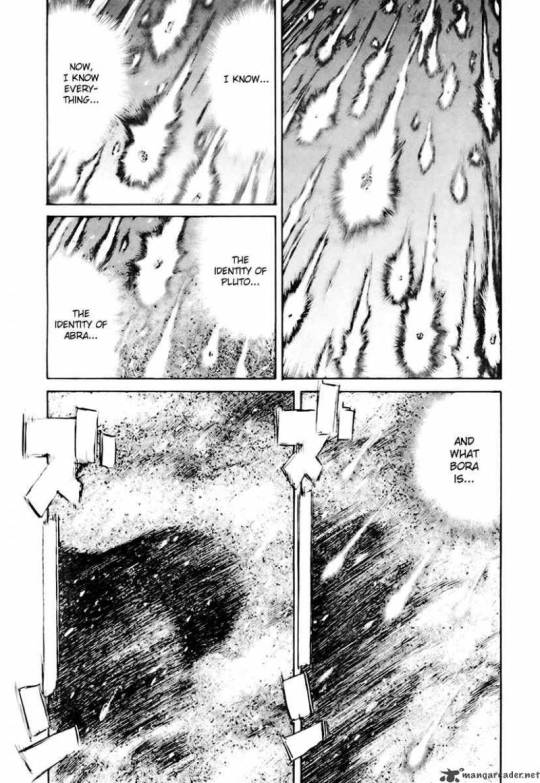
Let us also underline how “sorrow” (aka what Atom learnt from Epsilon) plays a part in the ending just as much as “hate” does. As a matter of fact once Atom overcomes his hatred he starts crying and so does Pluto and the two comment how strange that feeling is. It is also interesting how Epsilon’s death, just like Gesicht’s one is linked to a child. As a matter of fact the two robots both survived a fight against Pluto and gave up the chance to kill him only to then die trying to protect a child.
This is linked to the last point of the analysis i.e. to how Atom surviving is representative of the importance of protecting children and in this way the future itself.
After all, throughout the narrative Atom is paralleled to Gesicht’s child, so it is meaningful that in the end he survives thanks to Gesicht’s sacrifice. At the same time he is the one inheriting Gesicht’s legacy like a child who is taught by a parent. Even if the parent messed up he has still the chance to teach the child to be better. So, Atom is able to put into practice what Gesicht learnt and is able to connect with Pluto.
In conclusion, to answer the question which started this analysis I would say that the Greatest Robot on Earth is not the strongest or the one who exhibits somehow better qualities than humans, but it is a robot who is human and who at the same time is able to learn from humans (like the robots developing emotions by imitating human behaviours), but also to teach humans to be better:
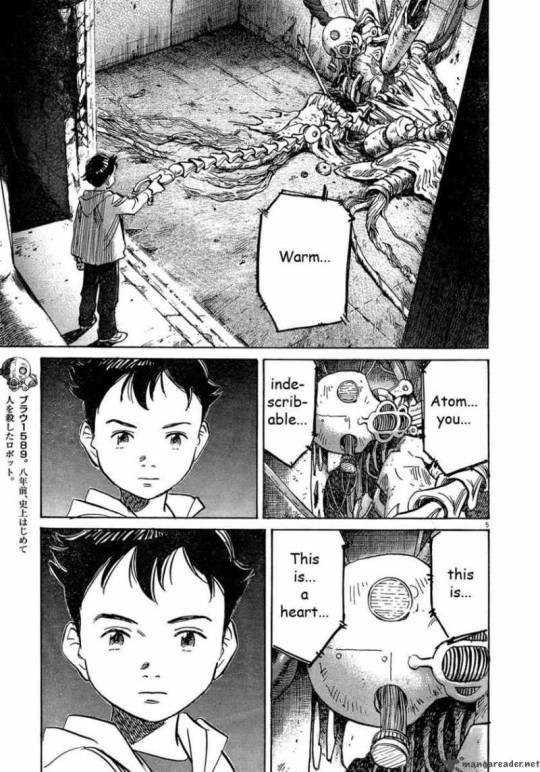
This is evident also in how Brau develops. Brau has always been an AI very similar to humans since he managed to develop hate, but after his meeting with Atom he starts to understand something else. He calls it “a heart” and he is able to feel it both in a person as noble as Atom and in a person as despicable as the President. The fact that in the end he chooses to kill Doctor Roosevelt instead of the President underlines a choice the character makes. Despite how much imperfect humans are Brau still chooses them over an AI who is incredibly advanced and intelligent, but lacks a “heart”.
#naoki urasawa's pluto#naoki urasawa's pluto meta#pluto meta#my meta#gesicht#pluto#tetsuwan atom#uran#professor tenma#umataro tenma#epsilon#naoki urasawa
216 notes
·
View notes
Text
Dalek and the Doctor
@torchwoodwho I made an observation a while back on a blog post about “Into the Dalek” about the Doctor and comparing him to Daleks. I noted that into the Dalek falls flat for me, and felt like a rehash of things we’ve already seen.
I’m going to look at “Dalek,” “Daleks in Manhattan/Evolution of the Daleks,” and “Into the Dalek” today. When are Daleks compelling, and when does comparing the Doctor to a Dalek hold weight?
ETA: this has turned out to be very long, so I’m going to split it up into at least two posts. This one is about “Dalek.”
I’ve only gotten close to being disturbed three times while watching Doctor Who, and two of those were cybermen episodes (playing on a real fear of people doing something to you while you are powerless over your own body). Yet Dalek is also my favorite episode of New Who. Why?
The Randomwhoness blog said it better than I can:
“To directly compare the Doctor to a monster is rarer, but that’s what Dalek does, through role reversal. The Doctor for instance, played with saliva propelling emotion by Eccleston, behaves in a very un-Doctorly way. Upon first discovering the Dalek, the Doctor does not do any of his normal tricks. He doesn’t negotiate or befriend or cajole. He just tries to exterminate it. The first instinct of a Dalek.
The Dalek meanwhile demonstrates its Doctory ingenuity at every turn. It absorbs energy from Rose and escapes by tricking its enemies into a false sense of security before suckering their faces. Its next step is to absorb information. ‘The Dalek’s a genius,’ the Doctor warns. So just like him then, but murderous. Oh, he’s that too now.
For the rest of the episode, the Doctor is largely impotent. He can merely react to what Dalek does. It’s his own tactic turned against him....
...This culminates in a famous scene where the Dalek chooses to destroys a room full of soldiers by setting the sprinkler system off and electrocuting them with one zappy shot. It’s interesting because there’s no plot reason for it to show such an innovative approach to death; we all know it could just pick off those guards one by one. It chooses the showy way of killing, presumably as a display of strength and to terrify any onlookers. It certainly seems to work on the Doctor, who ends up bawling at the screen...‘why can’t you just DIE?!’ But this is surely the Doctor’s modus operandi: come up with a clever solution which not only does the job but underlines your point....
...By episode’s end, the Dalek has used guile and intelligence to work its way to freedom, and stands at the finale with the spunky girl by its side. The Doctor on the other hand has resorted to wielding a big gun. Rose says to him, ‘What the hell are you changing into?’ making the implied point explicit. As it turns out, the story’s conclusion has very little to do with him. The Dalek commits suicide with Rose’s consent, while the Doctor is reduced to a bystander. In a strange way, the Dalek has won, while the Doctor has failed at every turn.”
From: https://randomwhoness.com/2014/12/19/the-monster-the-doctor-and-dalek-2005/
“Dalek” makes an effective comparison between the Doctor and the Dalek because it uses more than dialogue to make the comparison.
Another fantastic element of Dalek is how sparing it is. Nowadays we’re used to hordes of Daleks in season finales. Those tend to be big, galaxy-ending battles that are thwarted clever solutions, since Daleks don’t seem to take casualties like ordinary armies (in fact, we never see them being clever when they’re out in full force. They seem to be scary only because they can take you down, but you can’t reciprocate).
In “Dalek,” we see just one Dalek, and in it, the Doctor has met his match. They’re confined and racing against each other. The equal weight and the power of just one Dalek makes Daleks at large infinitely more intimidating. Precision can pack just as much punch as an onslaught.
The whole episode is structured around the contrast, and its purposes (beyond introducing an old villain in a fresh way) include revealing something fundamental about the new doctor’s character.
So, I love Eccleston, and I love the 2005 season. “Dalek” challenged everything I thought I knew about the Doctor: that he was incapable of looking for a violent solution. Up until “Dalek,” the doctor was a survivor, a refugee of sorts, drifting through space and mourning his people, lost in the war. He looked for solutions that kept people alive, and seemed to genuinely regret casualties, even when the dead had tried to kill him. Then “Dalek” changed everything.
I did a quick look through transcripts, and “Dalek” is the first time the Doctor reveals that he ended the Time War. Before that, we’d figured out that everyone was dead and he was the last one, and that he tried to save them, but not that he was the direct cause of their deaths. But before he admitted that, we watched him seethe with anger and pain. We watched out previously killing-averse Doctor jump to torture and murder, and not after a long, on-screen provocation, but as soon as he found out what the Dalek was. As a new viewer, I didn’t really know what a Dalek was, but I wanted to know what could possibly make the “It’s a different morality. Get used to it”-Doctor that distressed. I was disturbed, both by what the Doctor was doing, and by what could have made him that way. I didn’t know what he was going to do next, or what he was capable of. I also hurt seeing him in that much pain.
In this episode, Rose doesn’t see any of this. All she hears is the Doctor defending her after he thought she dies, and keeping everyone alive as the Dalek approaches. She doesn’t watch the Dalek murder a roomful of people. By contrast, what Rose does see is a Dalek that’s just slightly human, one that’s “beginning to question itself,” enough to pity it.
Of course she’s horrified by the Doctor we see at the end, who wants to kill it. She hasn’t seen any of the grief and pain that the audience has seen. When she says “What the hell are you changing into?” we know both sides of the story. We know the Doctor is much more like a Dalek than we thought, but we’re not condemning him for wanting to kill it because we finally understand why he’s going around with such a weight of guilt.
To recap: when Dalek compares the Doctor to a Dalek, it does do effectively because we are shown, not told, the depth of the Doctor’s hate by his reactions, because of a sudden contrast in his behavior in previous episodes, and because the Doctor is structurally compared to the Dalek across the whole episode by reversing their roles.
For my last point, I want to look at what moral pronouncement we give the doctor as a result of the episode. Comparing the Doctor to a Dalek is always supposed to shock us, since the Doctor’s a life-defender and they’re robot exterminators. As the audience, it’s up to us to answer the question “Is the Doctor just like a Dalek?” and why we answer no is best illustrated by the placement of the two lines that explicitly compare the Doctor to a Dalek.
Mid episode, right after the Doctor’s explosion of temper:
DALEK: You would make a good Dalek.
End of episode:
ROSE: ...What about you, Doctor? What the hell are you changing into?
If the whole episode is about comparing the Doctor to a Dalek, why is the Dalek’s line at the beginning-middle of the episode?
Because this episode is about more than Daleks. More than them, it’s about who the Doctor is. We’ve gotten little hints and followed the breadcrumbs to figure out what the time war was, but this episode takes off his bandages to show us the raw wounds still there. Like Donna in the Sontaran Stratagem, we don’t really know who the Doctor is, and not knowing could be dangerous because we don’t really know what he’s capable of. We assume he’s a good guy because we haven’t really seen him do evil--all deaths around him have happened as willing sacrifice (Jabe the tree, Gwyneth), by the hands of others, or in hands-off, retaliatory justice fashion (the Nestene consciousness, the Slovene, Cassandra). He had never pulled the trigger, so to speak. Now we know he has done so before, and will do it again.
We saw his explosion of pain-fueled rage at the Dalek, and it was shocking. When the Dalek calls him on it, we’re inclined to agree, and yet we can tell there’s so much emotion and guilt underneath it, something a Dalek is incapable of.
Between that line and the ending, what happens? We watch the Doctor suffer fresh grief as the closest thing he has to family dies again, right before his eyes, at the hands of a Dalek. When he realizes she lives, he has a chance, in a way, to live it all over again. What does he change when he gets a do-over?
DALEK [on screen]: Open the bulkhead or Rose Tyler dies. DOCTOR: You're alive! ROSE [on screen]: Can't get rid of me. DOCTOR: I thought you were dead. DALEK [on screen]: Open the bulkhead! ROSE [on screen]: Don't do it! DALEK [on screen]: What use are emotions if you will not save the woman you love? DOCTOR: I killed her once. I can't do it again. (The bulkhead opens. Rose and the Dalek walk through.)
He releases a Dalek to save someone he cares about, to hell with the consequences. This choice is key to the Ninth Doctor’s character, and it’s key to the decision he makes in the finale. He is not actually a Dalek, because the guilt and grief he experiences after he’s pulled the trigger is so overwhelming that he can’t do it again. Yet if we’re to learn who the Doctor is, we cannot forget him earlier in the episode: he can be mad with grief and is capable of frightening things in his anger.
The ultimate pronouncement is made by a character who represents us. From “Rose” on, Rose is our eyes on the series, and in “Dalek,” she’s us--from earlier in the episode. She reminds us how we felt when we saw the Doctor attack the Dalek, spit flying, and is rightfully disturbed about what seems a total character change.
Yet, we’ve seen why the Doctor reacts the way he does, and we’ve incorporated this new information into our understanding of him, just like the Dalek with Rose’s DNA. We trust Rose to learn about him, just like we have, but she stands there as a reminder that the Doctor isn’t some moral abstraction of goodness, but someone who, despite awe-inspiring abilities, is just as flawed as you and me, and needs someone to remind him who he aspires to be and who he can grow into.
DOCTOR: Get out of the way. Rose, get out of the way now! ROSE: No. I won't let you do this. DOCTOR: That thing killed hundreds of people. ROSE: It's not the one pointing the gun at me. DOCTOR: I've got to do this. I've got to end it. The Daleks destroyed my home, my people. I've got nothing left. ROSE: Look at it. DOCTOR: What's it doing? ROSE: It's the sunlight, that's all it wants. DOCTOR: But it can't ROSE: It couldn't kill Van Statten, it couldn't kill me. It's changing. What about you, Doctor? What the hell are you changing into? DOCTOR: I couldn't. I wasn't. Oh, Rose. They're all dead. DALEK: Why do we survive? DOCTOR: I don't know.
If you want to compare the Doctor to a Dalek, this is the way to do it.
2 notes
·
View notes